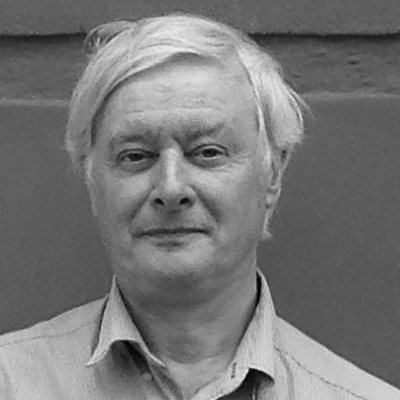The Intelligence Park

CYFLWYNIAD
Music Theatre Wales a’r Royal Opera House
Gyda’r London Sinfonietta
Cerddoriaeth gan Gerald Barry
Libretto gan Vincent Deane
Dulyn, 1753. Mae gwaith cyfansoddwr opera rhwystredig a thlawd yn mynd o chwith wrth iddo gwympo am ei brif ganwr castrato – ond yna mae’r castrato yn rhedeg i ffwrdd gyda dyweddi gyfoethog y cyfansoddwr, gan achosi anhrefn a thrychineb i bawb a phopeth.
Mae operâu Gerald Barry yn wahanol i unrhyw beth arall – yn fentrus, yn swreal, ac yn aml yn gwneud i chi chwerthin yn uchel. Ffrwydrodd The Intelligence Park ar y llwyfan yn Llundain yn 1990, gan gyflwyno llais operatig unigryw i’r byd. Bron i 30 mlynedd yn ddiweddarach, mae cynhyrchiad Baróc newydd, cymhleth y cyfarwyddwr/cynllunydd Nigel Lowery yn ailddarganfod ei storfa o emosiynau, cymeriadau ac elfennau absẃrd mewn cwmwl o ddychymyg a realiti, wrth iddo archwilio syniadau o rywioldeb, creadigedd a rhwymedigaeth.
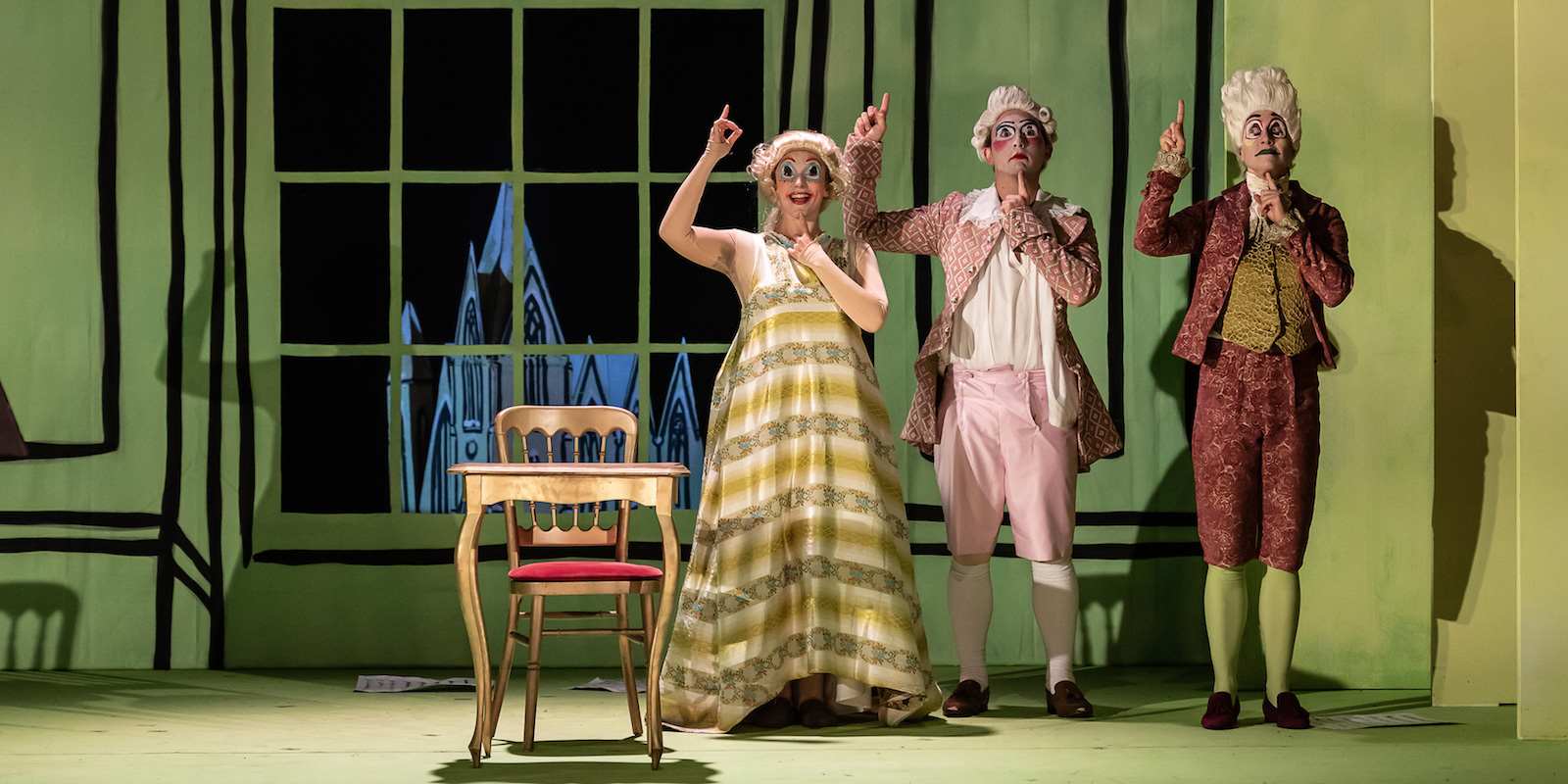
Y CYNHYRCHIAD
“This production will take Music Theatre Wales in a new direction, referencing the Baroque roots of the opera’s story set in 18th century Dublin and of Gerald Barry’s music (Handel somehow hovers over this music), but in an utterly contemporary and overtly theatrical way.
We’ve never done painted sets and Baroque-inspired costumes before, but this is exactly what The Intelligence Park cries out for and is the treatment it will receive, but don’t be deceived. This is NOT a Baroque opera! Here the Baroque will be exposed and messed-up, enabling us to see into the human drama that lies at the centre of this story, in which things go horribly wrong for an artist who is struggling to create and struggling to survive, yet lives under constant pressure to obey society’s rules, all of which run counter to his instincts.
He falls madly in love (or is it obsession) with the castrato who is officially teaching his fiancée to sing. But worse than that, the castrato and fiancée end up inhabiting the opera he is trying to write, and in real life end up eloping! This is only brought to an end when the fiancée’s father – a powerful and tradition-loving judge - cheats the castrato and his daughter into returning home only for the castrato to be thrown in to prison. “The prison of life” as Nigel Lowery puts it – the rules and regulations that surround us, the expectations placed on us and the limitations placed on our imaginations.
The Intelligence Park rails against all this and cries out for freedom of the imagination, a release from the confines of everyday life in every possible aspect – creativity, sexuality and morality. Barry’s music represents all this, inventing its own rules and defying convention, and it is all the stronger for doing so, but it demands some commitment from the listener too.
When asked to put pen to paper and introduce us to the world of The Intelligence Park, director-designer Nigel Lowery produced an extraordinary statement:
Poetry and music assault a labyrinthine dungeon, intelligence boils out of control…
Suppose a castrato elopes with the daughter of a bombastic judge! Suppose this hungry castrato enflames the lifeblood of a desperate composer! Thus reason becomes trapped within a park of fatal attractions.
And all the while time is in orbit, spinning its melancholic veil, a final curtain to end a performance of sorrow, denial, obsession and horror!
The opera references an historic solar eclipse which Dublin experienced in the 18th century as a portent of doom, but it also represents the upper class of Dublin society as Dummies only interested in playing cards and eating banquets! Lowery’s production will play with the idea of the prison and of crushed hopes, but will celebrate the power of the imagination and the artist, with deliberately painted sets that are not a representation of reality but are more like a Pollock toy theatre where the imagination can run riot.
With all of Gerald Barry’s work the one thing you can expect, is the unexpected.”
Lawrlwytho crynodebMichael McCarthy, Cyfarwyddwr Artistig, Music Theatre Wales
Straeon cynhyrchu a mewnwelediadau
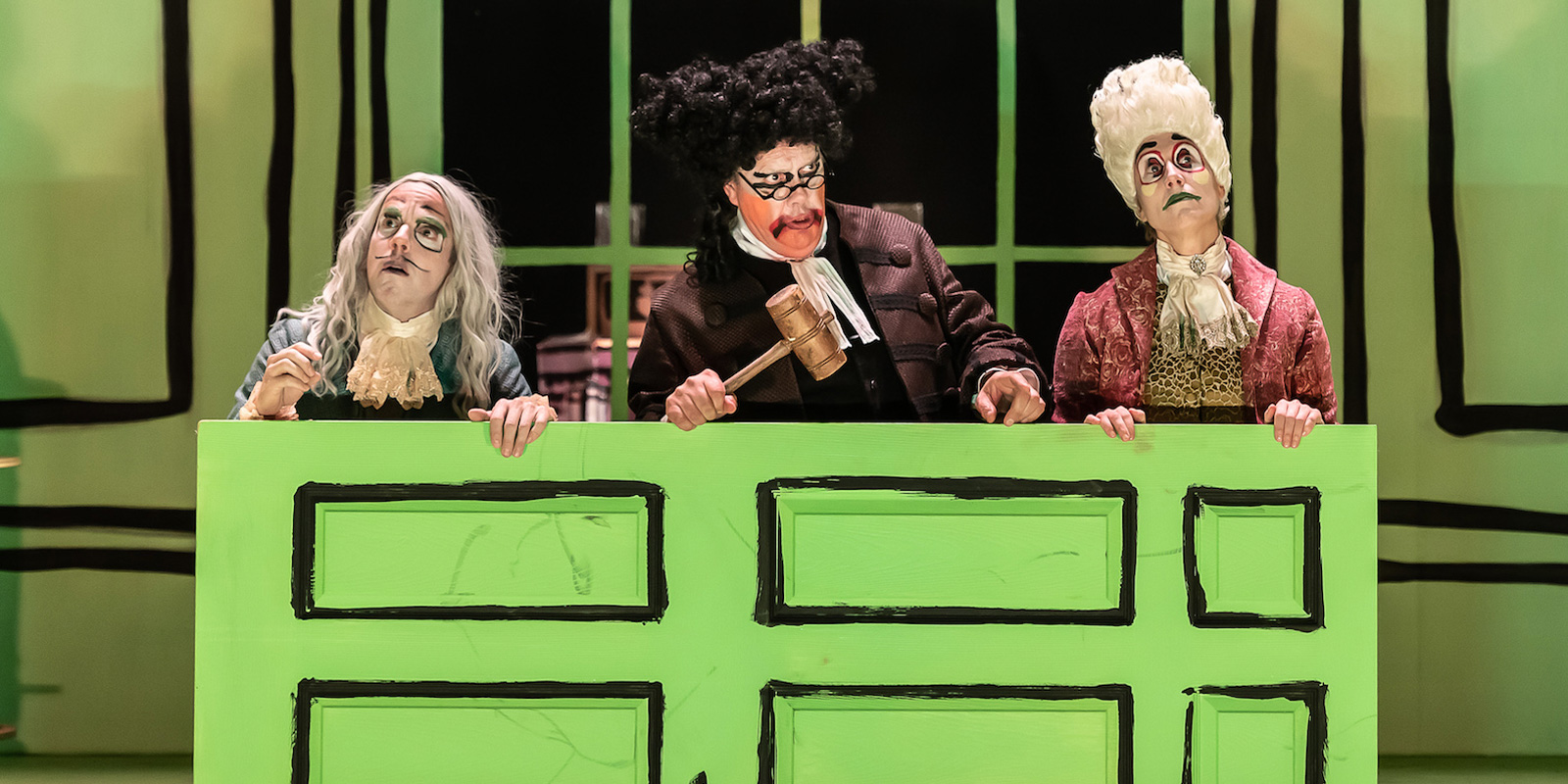
CAST A PHERFFORMWYR
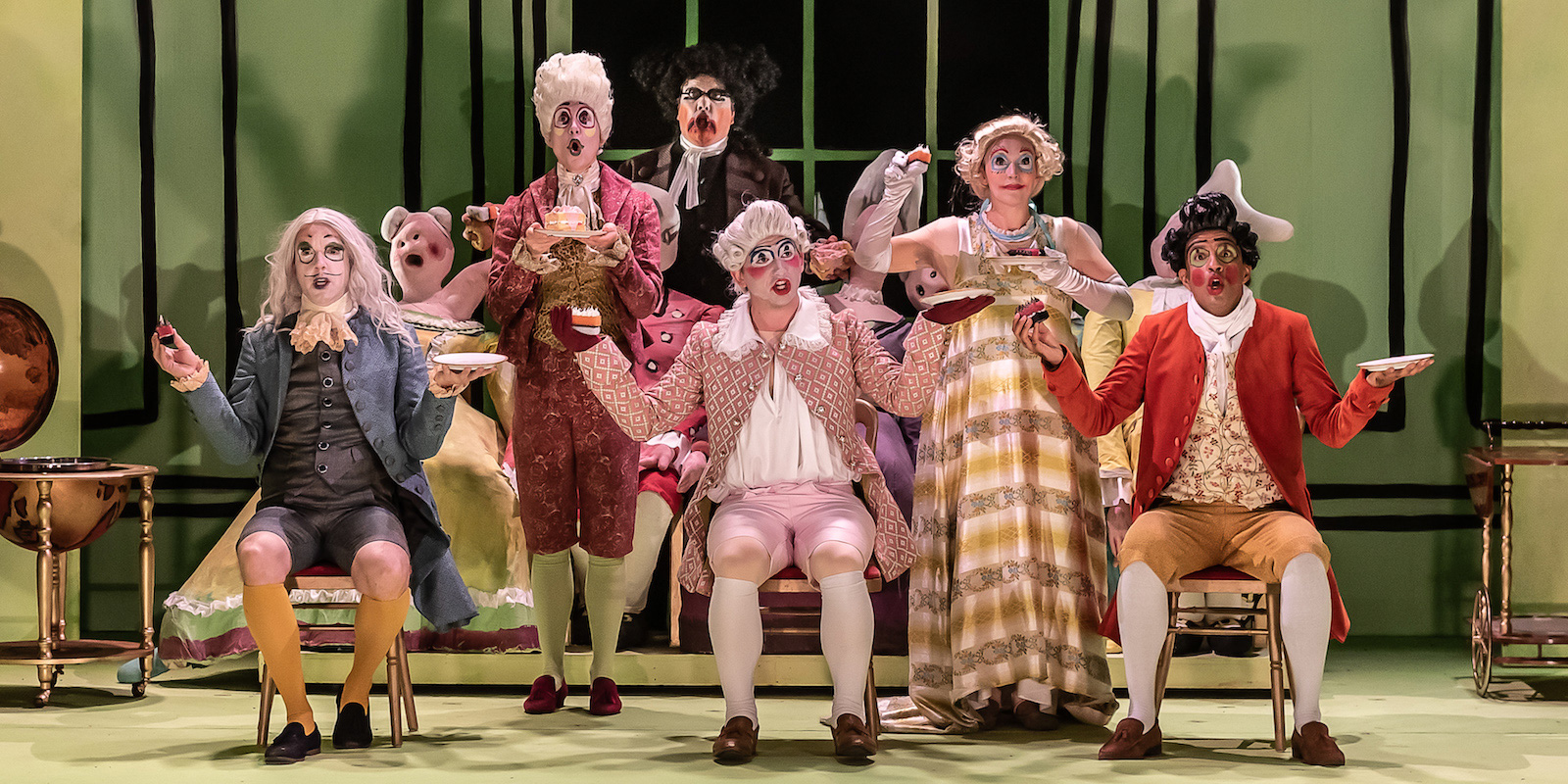
Reviews
One moment grotesquely funny; the next touchingly beautiful
The Guardian (The Intelligence Park CD review, 2005)
One moment grotesquely funny; the next touchingly beautiful
The Guardian (Adolygiad o CD, The Intelligence Park, 2005)
The London Sinfonietta’s virtuosity, and the cast’s miraculous achievements were, without exaggeration, phenomenal.
DYDDIADAU’R DAITH
-
PRYNWCH DOCYNNAU
Linbury Theatre, Royal Opera House, Llundain
Dydd Mercher, 25 Medi - Dydd Gwener, 4 Hydref
-
PRYNWCH DOCYNNAU
Theatr y Sherman, Caerdydd
Dydd Mawrth, 8 Hydref
-
PRYNWCH DOCYNNAU
RNCM, Manchester
Dydd Sadwrn, 12 Hydref
-
PRYNWCH DOCYNNAU
Birmingham Repertory Theatre
Dydd Llun, 4 Tachwedd

GEOFFREY PATERSON, Arweinydd
Astudiodd Geoffrey Paterson gerddoriaeth ym Mhrifysgol Caergrawnt ac yn y Royal Scottish Academy of Music and Drama, gan gymryd gwersi cyfansoddi o Alexander Goehr a chymryd rhan mewn meistr ddosbarthiadau gyda Pierre Boulez. Enillodd y wobr gyntaf yng Nghystadleuaeth Arweinwyr Leeds 2009.
Mae’n gweithio’n rheolaidd yn y Royal Opera House, Covent Garden, lle arferai fod yn aelod o Raglen Artistiaid Ifanc Jette Parker, yn helpu arweinwyr gan gynnwys Antonio Pappano, Mark Elder, Andris Nelsons a Daniele Gatti ar repertoire helaeth. Gweithiodd am ddau dymor yn Bayreuth yn gymhorthydd cerddorol i Kirill Petrenko ar gyfer Der Ring des Nibelungen.
Arweiniodd Le Portrait de Manon a sawl permiere byd ar gyfer yr ROH. Bu hefyd yn arwain yn Opera North (La bohème), Opera Brenhinol Danmarc (Porgy and Bess a The Nutcracker), Glyndebourne (Followers a Die Entführung aus dem Serail), Ilford Festival Opera (Don Giovanni a La Vie Parisienne), Gwyliau Aldeburgh a’r Iseldiroedd (The Corridor a The Cure) a Gwyliau Buxton a Bregenz (Gloria von Jaxtberg).
Mae’n gweithio’n reolaidd gyda’r London Sinfonietta, ac ymhlith ei ymddangosiadau diweddar mewn cyngherddau mae’r Manchester Camerata, Cerddorf Simffoni Hamburg a Cherddorfa SIambr yr Alban. Mae wedi recordio ar gyfer NMC gyda’r London Sinfonietta ac ar gyfer BBC Radio 3 gyda Cherddorfa Simfoni’r BBC.

MICHAEL MCCARTHY, Cyfarwyddwr
I co-founded Music Theatre Wales in 1988, and as Artistic Cyfarwyddwr I want the company to stay at the forefront of new opera in Wales, the UK and beyond. Alongside MTW, from 1998-2012 I was Artistic Cyfarwyddwr of Operatoriet - the contemporary opera studio for Norway, and from 2007 – 2012 I was Dramaturg for FIVE:15 - Operas Made in Scotland for Scottish Opera. In 2012 I led the Opera Creation Academy at the Festival d’Aix-en-Provence. In the 1980s I was fortunate to work as revival Cyfarwyddwr for The Fires of London, the company run by Peter Maxwell Davies.
I have staged over 40 contemporary operas and worked on more than 100 new works. Other productions include large-scale outdoor stagings of Tosca and Nabucco, and productions of La Traviata, Cosi fan Tutte, Il Re Pastore, Fidelio and Don Giovanni. Also, Cinderella by Peter Maxwell Davies for WNO and S4C Television, The Lighthouse for BBC2 TV and The Forbidden Hymn - a community opera in the South Wales Valleys. Future plans include the USA premiere of The Trial by Philip Glass in St Louis following performances in Scotland, and future productions for Music Theatre Wales.
In January 2015 I was awarded Best Cyfarwyddwr at the Wales Theatre Awards for my world premiere production of The Trial by Philip Glass for Music Theatre Wales. My production of Greek won Outstanding Achievement in Opera at the TMA Awards. I was honoured with an MBE in the Queen’s New Year’s Honours in 2016.
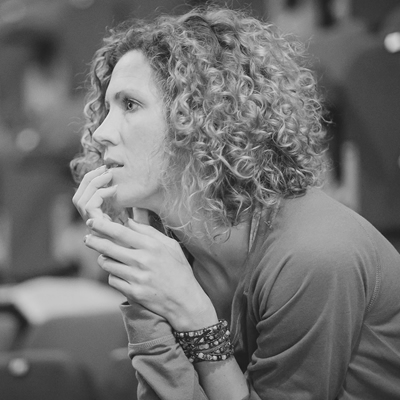
Caroline Finn, Cyd-Gyfarwyddwr
A hithau wedi ei geni yn Lloegr, mynychodd Caroline Finn yr Arts Educational School, Tring ac yna y Juilliard School, Efrog Newydd, lle graddiodd ag BFA mewn dawns. Fel dawnsiwr, mae Caroline wedi perfformio gyda’r Ballet Theatre Munich dan gyfarwyddyd Philip Taylor; Ballet Preljocaj (Ffrainc) a Compagnie Carolyn Carlson (Ffrainc). Mae Caroline Finn wedi gweithio fel dawnsiwr a choreograffydd ers 2009 gan greu gweithiau ar gyfer cwmnïau megis y Tanz Luzerner Theatre (Y Swistir); Cwmni Ballet Cenedlaethol Chile, Cross Connection Ballet (Denmarc); Compagnie DIEM (Ffrainc) a Teatr Groteska (Gwlad Pwyl). Mae hi wedi cyflwyno ei gweithiau ledled y byd mewn gwyliau yn Ne Korea, Japan, Berlin a Paris, ymhlith mannau eraill. Ar ôl ennill y Matthew Bourne New Adventures Choreographer Award 2014, cafodd ei chomisiynu’n fuan wedyn i greu ‘Bloom’ ar gyfer y Phoenix Dance Theatre.
Caroline yw Coreograffydd Preswyl Cwmni Dawns Cenedlaethol Cymru. Mae hi wedi creu pedwar darn newydd ar gyfer y cwmni, yn cynnwys Folk a The Green House.
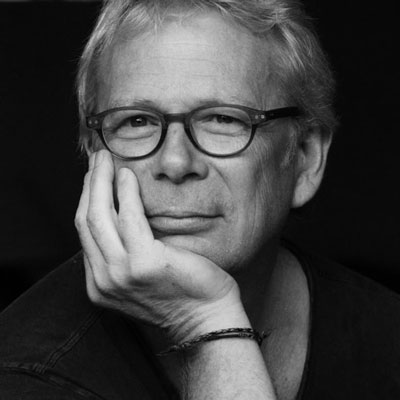
SIMON BANHAM, Cynllunydd
Mae gan Simon berthynas waith hir gyda Music Theatre Wales, yn fwyaf diweddar gyda’r dangosiad cyntaf erioed o opera newydd Philip Glass, sef Y Prawf (The Trial). Cyn hynny, fe gynlluniodd Premirer Prydeinig Luci Mie Traditrici a Greek (Cyflawniad Rhagorol mewn Opera 2011).
Mae’n aelod sylfaenol o gwmni theatr Quarantine, ac mae’n gyfrifol am yr olygraffiaeth (scenography) ar gyfer eu holl gynhyrchiadau y ystod y 18 mlynedd diwethaf. Yn fwy diweddar Summer, Autumn, Winter, Spring, sef pedwarawd o weithiau a berfformiwyd dros gyfnod o un diwrnod, a Wallflower, sef darn cyfnodol sydd yn ceisio cofio pob dawns a ddawnsiwyd erioed.
Yn ddiweddar mae wedi dechrau cydweithio gyda Mike Pearson a Mike Brookes ar gorff llawn o waith gyda National Theatre Wales - The Persians (Gwobr Cynllunio Gorau 2010 gan y TMA) a Coriolan/us, (dewiswyd ar gyfer arddangosfa yn The World Stage Design 2013), a’r Iliad.
Ar hyn o bryd mae Simon yn dysgu ym Mhrifysgol Aberystwyth, Cymru, lle mae’n Darllen Golygraffiaeth a chynllunio ar gyfer y Theatr.

ACE MCCARRON, Cynllunydd Golau
Cynllunudd golau yw Ace McCarron sydd wedi ei leoli yng Nghaerdydd. Drwy weithio gyda chwniau fel The Fires of London, Music Theatre Wales a’r Operastudio Vlaanderen, mae e wedi dylunio a chynllunio goleuo ar gyfer nifer fawr o operau cyfoes. Mae’n adnabyddus am ei waith gyda nifer o gwmniau ysgrifennu newydd, a chyda cwmniau plant a theatr pobl dduon. Bu’n aelod o gwmni Howard Barker, The Wrestling School, ers 1989 a fe wnaeth oleuo eu cynhyrchiad wyth awr o hyd, The Ecstatic Bible yng Ngŵyl Adelaide.
Ymhlith ei weithiau cysylltiedig ag opera diweddar mae: The Devil Inside a In the Locked Room/Ghost Patrol – y ddau yn ddangosiadau premiere byd-eang ac yn gydgynhyrchiadau rhwng Music Theatre Wales a Scottish Opera, The Trial gan Philip Glass – premiere byd-eang arall, Greek (a welwyd ddiwethaf yng Ngŵyl Gerddoriaeth Tongyeong), Eight Songs for a Mad King, The Killing Flower (Luci mie traditrici gan Sciarrino), The Golden Dragon (Music Theatre Wales); Elle est Moi et Tote Mich, (Operastudio Vlaanderen); Orlando Paladino (Wiener Kammeroper); The Fairy Queen (Gŵyl Gerdd Istanbul); Waar is Mijn Zeil? (Muziektheater Transparent).
Gyda’r cyfansoddwr Guy Harries, enillodd wobr gyntaf Flourish am addasiad o’r gwaith Two Caravans gan Marina Lewycka.

Joe Fletcher, Lighting
Cynllunydd theatr llawrydd yw Joe, yn arbenigo mewn goleuo ac mewn cynllunio golygfeydd ar gyfer y theatr, dawns, digwyddiadau a phensaernïaeth. Treuliodd gyfnod fel Cyfarwyddwr Technegol a Chynllunydd Technegol gyda Chwmni Dawns Sydney a Chwmni Dawns Cenedlaethol Cymru, gan weithio gyda’r coreograffwyr Ohad Naharin, Christopher Bruce, Rafael Bonachela ac Angelin Preljocaj. Cafodd cynllun goleuo a fideo Joe ar gyfer Purlieus (Cwmni Dawns Cenedlaethol Cymru) ei ddewis fel un o’r goreuon yn y World Stage Design Exhibition 2013, a’i gynnwys ymhlith 15 uchafbwynt papur newydd The Daily Telegraph.
Ceir rhagor o wybodaeth am waith Joe yma: www.joefletcherdesign.co.uk

GUTO PUW, Cyfansoddwr
Astudiodd Guto Pryderi Puw gerDdoriaeth ym Mhrifysgol Bangor o dan y cyfansoddwyr John Pickard, Pwyll ap Siôn ac Andrew Lewis, gan ennill ei statws MMus yn 1996 ac yn hwyrach ei PhD mewn Cyfansoddi yn 2002. Cafodd ei benodi yn aelod llawn o staff yn 2006 gan ddarlithio’n bennaf ar Gyfansoddi a Cherddoriaeth Gyfoes a chafodd ei benodi yn Bennaeth Cyfansoddi yn 2015.
DaEth i amlygrwydd yn gyntaf wedi iddo ennill Medal y Cyfansoddwyr yn Eisteddfod Genedlaethol 1995 ac am yr ail waith yn 1997. Cafodd ei gerddoriaeth ei berfformio mewn nifer o wyliau o amgylch y Deyrnas Gyfunol a’i ddarlledu yn reolaidd ar y radio a’r teledu. Ym mis Chwefror 2006 daeth yn Gyfansoddwr Preswyl cychwynnol gyda Cherddorfa Genedlaethol BBC Cymru, gyda’i goncerto i’r Obo yn ennill category Gwobr y Gwrandawyr yng Ngwobrau Cyfansoddwyr Prydain yn 2007 ac fe gafodd ‘…onyt agoraf y drws…’ ei ddangosiad cyntaf neu “premiere” yn y Proms yn ystod yr un flwyddyn. Ei opera siambr gyntaf fydd y Tŵr, sydd yn seiliedig ar ddrama Gwenlyn Parry gyda libreto gan Gwyneth Glyn. Wedi ei gomisynu eisoes mae ei ail goncerto i’r fiolin, pedwarawd llinynol a gwaith cerddorfaol mawr.
Rhyddhawyd detholiad o’i weithiau cerddorfaol diweddar ar y cryno ddisg, “Reservoirs” gan recordiau Signum yn 2014. Cafodd wobr Syr Geraint Evans hefyd gan Urdd Cerddoriaeth Cymru am ei ‘gyfraniad sylweddol i gerddoriaeth Gymreig’ yn 2014. Bu Puw yn weithgar ers nifer o flynyddoedd yn hybu cerddoriaeth newydd yng ngogledd Cymru drwy ei weithgarwch fel aelod sylfaenol a chyfarwyddwr artistig Gŵyl Gerddoriaeth Bangor ers y flwyddyn 2000.
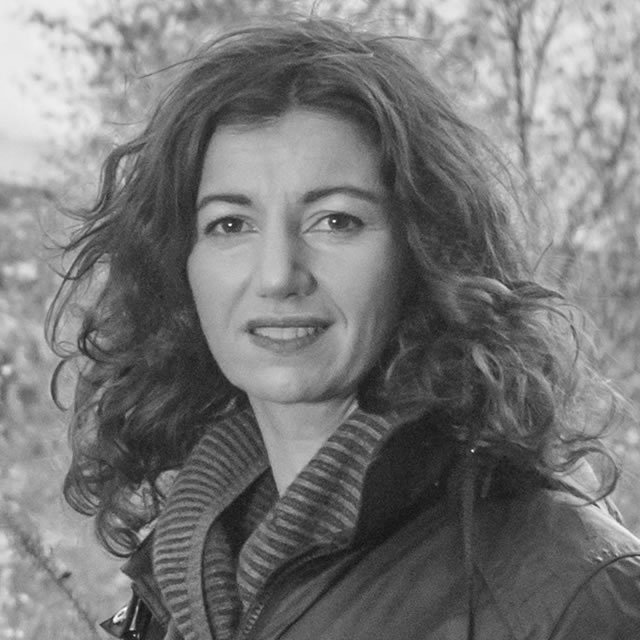
GWYNETH GLYN, Libretydd
Bardd, awdures, cyfansoddwraig a chantores yw Gwyneth Glyn, sydd yn byw yng Nghricieth, Gogledd Cymru. Hi oedd Bardd Plant Cymru 2006-2007 ac mae wedi ysgrifennu’n helaeth ar gyfer y theatr yng Nghymru, gan gynnwys darnau ar gyfer Theatr Genedlaethol Cymru, Bara Caws, Frân Wen, De Oscuro a chynhyrchiad Music Theatre Wales o Stori’r Milwr/The Soldier’s Tale. Mae’n ysgrifennu’n rheolaidd ar gyfer yr opera sebon, Pobol y Cwm. Mae hi hefyd wedi perfformio’n ryngwladol yn WOMEX, Gŵyl Bywyd Gwerin y Smithsonian, Washington DC, ac yng ngŵyl y Folk Alliance International yn Ninas Kansas. Yn 2015 cefnogodd Seckou Kita, y canwr Kora o Senegal ar ei daith o’r DG, ac fe gydweithiodd yn diweddar gyda cherddorion o Mumbai ar yr albwm Ghazalaw, sydd yn plethu caneuon gwerin Cymraeg gyda chaneuon Ghazal India. Ar hyn o bryd mae hi’n recordio ei halbwm unigol nesaf.
Gallwch ddod o hyd i fwy o wybodaeth am Gwyneth yma: http://gwynethglyn.com/
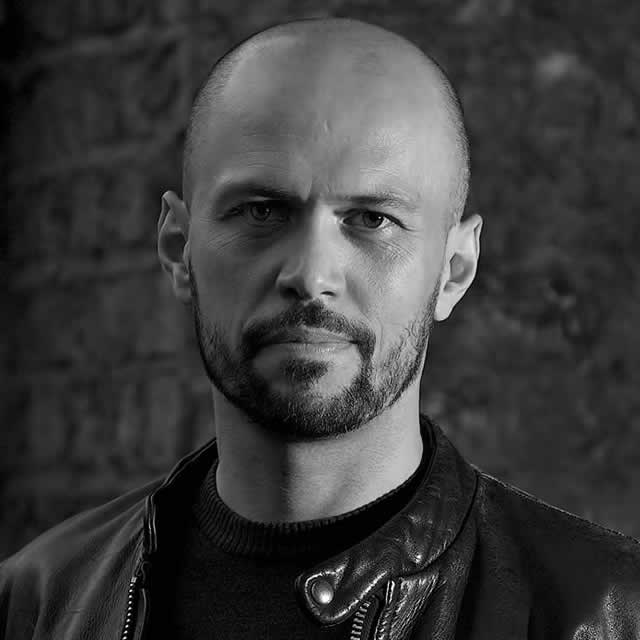
RICHARD BAKER, Arweinydd
Mae Richard Baker yn ffigur blaenllaw yn myd cerddoriaeth gyfoes Prydain fel un o gyfansoddwyr-arweinwyr mwyaf blaenllaw ei genhedlaeth. Astudiod ei gyfansoddiad yn yr Iseldiroedd gyda Louis Andriessen ac yn Llundain gyda John Woolrich, a daeth i sylw arwyddocaol yn gyntaf gyda dau o’i weithiau cynnar - Los Rábanos (1998) a Learning to Fly (1999). Comisiynwyd Hommagesquisse, sef darn nodweddiadol o ddyfeisgar, llawn cymeriad, gan Grŵp Cerddoriaeth Gyfoes Birmingham – sef mudiad sydd â pherthynas gref â Richard fel arweinydd – er mwyn cofnodi ymweliad Pierre Boulez â’r ddinas yn 2008. Yn 2010, perfformiwyd cerddoriaeth Baker yng nghyfres ‘Music of Today’ y Philharmonia, ac fe ysgrifenodd ‘Gaming’ yn yr un flwyddyn, sef gwaith siambr sylweddol, ar gyfer soddgrwth, marimba a phiano, yn gomisiwn gan y triawd hwnnw a leolir yn Efrog Newydd, Real Quiet. Cafodd ei ail gomisiwn gan Grŵp Cerddoriaeth Gyfoes Birmingham, ‘The Tyranny of Fun’, ei lwyfannu’n gyntaf ym mis Chwefror 2013, ac fe barodd i Andrew Clements o bapur y Guardian i ddweud ‘pa mor sicr a hyderus yw ysgrifennu ensemble Baker, a pha mor fyw yw’r cnawd mae’n eo roi ar y fframwaith strwythurol’. Cafodd y gwaith ei roi ar y rhestr fer am Wobr y Gymdeithas Philharmonig Frenhinol llynedd. Cafodd tri darn siambr eu perfformio am y tro cyntaf yn 2015/16, yn weithiau ar gyfer piano unigol, telyn unigol, a thriawd llinynol. Ysgrifennodd waith newydd ar gyfer Grŵp Birmingham i ddod â’r tymor i ben.
Fel cyfansoddwr, mae Richard yn gweithio’n reolaidd gyda phrif gyfansoddwyr ein hoes. Yn hydref 2012, arweiniodd gynhyrchiad English Touring Opera, wnaeth ennyn llawer o edmygedd, sef ‘The Lighthouse’ gan Maxwell Davies ac yng ngwanwyn 2013, cyfansoddodd raglen ddwbl Badisches Staatstheater Karlsruhe o waith Handel The Triumph of Time and Truth a gwaith Gerald Barry ‘The Triumph of Beauty and Deceit. Yn ystod tymor 2012-13 gwelwyd ei berfformiadau cyntaf gyda Cherddorfa Simffoni BBC yr Alban a Cherddorfa Genedlaethol BBC Cymru, gan ychwanegu i’r berthynas oedd yn bodoli eisoes gyda grwpiau ensemble gan gynnwys Sinfonietta Llundain, BCMG (Grŵp Cerddorfa Gyfoes Birmingham), Britten Sinfonia, Composers Ensemble ac Apartment House. Yng ngwanwyn 2014, arweiniodd raglen ddwbl o weithiau newydd gan Francisco Coll ac Elspeth Brooke yn Aldeburgh, the Linbury Studio (Royal Opera House) ac Opera North. (‘the wonderfully assured conducting of Richard Baker’ Guy Damman, Times). Cafodd ei ailwahodd ar unwaith ar gyfer cynhyrchiad wanwyn 2015 o The Virtues of Things gan Matt Rogers, ac fe gafodd ei wahodd unwaith eto y tymor diwethaf i arwain premiere hynod lwyddianus 4:48 Psychosis gan Phil Venables, a seiliwyd ar ddrama Sarah Kane.
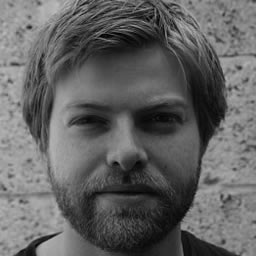
SAMAL BLAK, Cynllunydd
Yn enedigol o Ynysoedd Ffaro, hyfforddwyd Samal yng Ngholeg Central St. Martins College of Art & Design ac fe enillodd Wobr Libury 2009 dros Gynllunio i’r Llwyfan. Dewiswyd gwaith Samal i ddewis y DG fel rhan o arddangosfa ‘Make/Believe: UK Design for Performance 2011-2015′ yn amgueddfa’r V&A, a welwyd gynt yn y Prague Quadrennial.
Mae ei chynhyrchiadau eraill yn cynnwys: HAMLET (Gothenburg Opera); OTELLO (a enwebwyd ar gyfer gwobr gerddoriaeth 2010 yr RPS ar gyfer Opera Theatr Gerddorol), KHOVANSHCHINA (Ennillydd – Cynhyrchiad Newydd Gorau, Gwobrau Opera Rhyngwladol 2015) a LIFE IS A DREAM - premiere (Birmingham Opera Company); FALSTAFF a FIDELIO (Cwmni Opera Cenedlaethol Bucharest); THE DEVIL INSIDE (enwebwyd ar gyfer CYflawniad Rhyfeddol mewn opera yng Ngwobrau Theatr y DG 2016), IN THE LOCKED ROOM a GHOST PATROL (enillydd – Gwobr South Bank Sky Arts 2013) – premiere, (Scottish Opera a Music Theatre Wales); LES MAMELLES DE TIRESIAS (De Nationale Opera Amsterdam, La Monnaie Brussels, Aldeburgh Music, Festival d’Aix-en-Provence); TOSCA (Opera Ostfold, Norway); EUGENE ONEGIN (Theater an der Wien-in der kammeroper); GIASONE, AGRIPPINA, SIMON BOCCANEGRA, THE SIEGE OF CALAIS, COSI FAN TUTTE (ETO); L’INCORONAZIONE DI POPPEA (RCM, ETO); MACBETH (Geurilla Theatre Seoul); HOW TO BE AN OTHER WOMAN (Gate Theatre, Llundain).
Yn 2007 cafodd wobr Thorvald Poulsen av Steinum.
Am fwy o wybodaeth ewch i http://samalblak.com

STUART MACRAE, Cyfansoddwr
Yn enedigol o Inverness, Stuart MacRae yw un o gyfansoddwyr mwyaf hynod ei genhedlaeth, yn ysgrifennu cerddoriaeth â chanddo rym elfennol a chywreinrwydd emosiynol. Ymhlith rhai o’i weithiau mae Concerto i’r Fiolin (2001), Hamartia ar gyfer Soddgrwth ac Ensemble (2004) a Gaudete ar gyfer Soprano a Cherddorfa (2008), a berfformiwyd ar gyfer Proms y BBC. Yn aml bydd ei gerddoriaeth yn tynnu o strwythurau a delweddau natur, cymeriadau o fytholeg a barddoniaeth Ted Hughes, gyda Gaudete yn leoliad ar raddfa fawr.
Ymhlith ei weithiau ar gyfer y llwyfan mae’r opera, The Assassin Tree (2006) i gyfeiliant libreto gan Simon Armitage, a’r opera-ddawns Echo and Narcissus (2007). Mae wedi cydweithio gyda’r libretydd Louise Welsh ar ddau opera’n flaenorol: Remembrance Day (2009), sef rhan o broject Scottish Opera, “Five:15 Operas Made in Scotland”; a Ghost Patrol (2012), sef cyd-gynhyrchiad rhwng Scottish Opera a Music Theatre Wales. Enillodd Ghost wobr South Bank Sky Arts ac fe’i roddwyd ar y rhestr fer am Wobr Olivier.
Perfformiwyd cerddoriaeth Stuart yn reolaidd yn Stiwdio Linbury y Tŷ Opera Brenhinol a Gŵyl Ryngwladol Caeredin, a gan wahanol ensemblau gan gynwys Birmingham Contemporary Music Group, London Sinfonietta, Scottish Chamber Orchestra, Scottish Ensemble a’r Hebrides Ensemble, yn ogystal â nifer o o gerddorfeydd o amgylch y Deyrnas Gyfunol a thramor.
Roedd Stuart yn Gyfansoddwr Cyswllt gyda Cherddorfa Simffoni BBC yr Alban o 1999 hyd 2003. Ef oedd y cyfansoddwr preswyl yn y Spannungen Kammermusikfest yn Heimbach, yr Almaen yn 2003, a Chymrawd Creadigol Gŵyl Caeredin ym Mhrifysgol Caeredin o 2005 hyd 2006. O 2006 i 2007 roedd yn gyfansoddwr preswyl yn Internationales Künstlerhaus Villa Concordia yn Bamberg, Yr Almaen. Mae’n dysgu cyfansoddi yn Conservatoire Brenhinol yr Alban ac ym Mhrifysgol Caeredin.
Un o’i brojectau diweddar yw Parable, sef cyfosodiad o farddoniaeth Wilfred Owen a gomisiynwyd gan Ensemble Ynysoed Heledd (Hebrides Ensemble). Ar hyn o bryd mae’n gweithio ar ddarn newydd ar gyfer Côr Coleg Gonville & Caius, Caergrawnt, ac ail sonata piano ar gyfer y pianydd Simon Smith.
Cewch wybod mwy am Stuart yma.

Louise Welsh, Libretydd
Mae Louise Welsh yn awdures saith o nofelau, yn fwyaf diweddar, Death is a Welcome Guest (John Murray 2015). Mae wedi ysgrifennu nifer o storiau byrrion ac erthyglau yn ogystal â thair drama. Mae wedi golygu cyfrolau o ryddiaeth a barddoniaeth, ac wedi cyfrannu tuag at gyfnodolion amrywiol a chasgliadau o farddoniaeth. Hi yw golygydd Yonder Awa, sef casgliad o farddoniaeth yn seiliedig ar thema’r Alban a’r fasnach mewn caethweision a gafwyd ar hyd Gogledd yr Iwerydd gan ysgrifenwyr o’r Alban ac o’r Caribî, a Ghost, sef casgliad o un o gant o storiau ysbryd o Pliny the Younger i James Robertson (Head of Zeus 2015).
Mae hi wedi cyflwyno dros 30 rhaglen ar gyfer Radio’r BBC, gan gynnwys Hellfire Nation (BBC Radio Scotland), Bannockburn Begins (BBC Radio 3) a Welsh’s Scottish Journey (BBC Radio 4).
Ymhlith ei hymddangosiadau eraill ar Radio 4 mae Open Book, A Good Read, Saturday Review, Front Row, Woman’s Hour; BBC Radio 3: The Verb, Night Waves; BBC Radio Scotland: The Culture Café, Fred McAulay Show, Breaking the News.
Mae Louise wedi derbyn nifer o wobrau a chymrawdiau rhyngwladol, gan gynnwys Doethuriaeth Anrhydeddus yn y Celfyddydau o Brifysgol Napier Caeredin a bod yn Gymrawd Anrhydeddus o Raglen Ysgrifennu Rhynglwadol Prifysgol Iowa.
Mae hi wedi cydweithio gyda’r cyfanoddwr Stuart MacRae ar ddau opera blaenorol: Remembrance Day, rhan o broject “Scottish Opera’s Five: 15 Operas Made in Scotland”, a Ghost Patrol, sef cydgynhyyrchiad rhwng Scottish Opera a Music Theatre Wales. Enillodd Ghost Patrol Wobr South Bank Sky Arts ac fe’i rhoddwyd ar y rhestr fer am Wobr Olivier.
Yn 2014. Louise oedd cyd-sefydlwr a chyfarwyddwr (ynghŷd â Jude Barber o Collective Architecture) yr Empire Café, sef ymchwiliad aml-ddisgyblaethol i berthynas yr Alban gyda’r fasnach yng Ngogledd yr Iwerydd mewn caethweision. Enillodd y project nifer o wobrau ac fe gafodd ei gynnwys yn Rhaglen Ddiwyllianol Gemau’r Gymanwlad Glasgow.
Hi yw Athro Ysgrifennu Creadigol Prifysgol Glasgow.
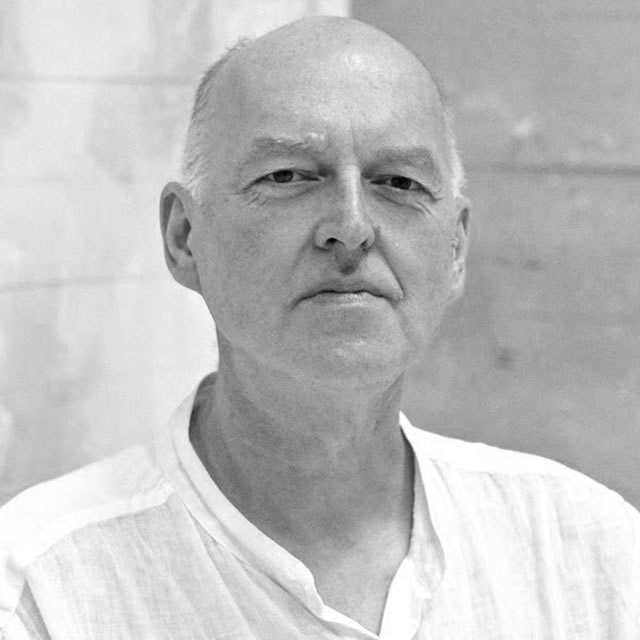
Michael Rafferty, Arweinydd
After a short career as a research physicist, Michael Rafferty switched to music initially as a violinist and later as Arweinydd. He is co-founder and Joint Artistic Cyfarwyddwr of Music Theatre Wales and has conducted all its productions. Other conducting has included performances with the BBC Concert Orchestra, Scottish Chamber Orchestra, London Mozart Players, Orchestre Symphonique de Mulhouse, Norway’s BIT 20 Ensemble, Musikfabrik of Cologne, The Cyfansoddwrs’ Ensemble and PM Music Ensemble. Altogether, he has conducted the works of more than 80 living Cyfansoddwrs and 40 opera productions.
Many of his performances have been broadcreative on radio and TV and he has made several CDs - most recently, Michael Berkeley’s opera For You released on Signum Classics and In the Penal Colony, released on Philip Glass’s own label Orange Mountain Music. In November 2010 he was awarded a prestigious Arts Council of Wales Creative Wales Award. In the 2016 New Year Honours he was awarded MBE for services to music in Wales.
Find out more about Michael here.

MATTHEW RICHARDSON, Cyfarwyddwr
Matthew Richardson was born in England. He trained and worked in theatre in New Zealand before returning to the UK. Scottish Opera engagements: Ghost Patrol (also for Music Theatre Wales– world premiere), Rigoletto, Five:15 2010, The Tales of Hoffmann, Jenůfa.
Operatic engagements include: Poet and Prophetess by Mats Larsson Gothe (NorrlandsOperan Sweden, Cape Town); Macbeth (Malmö); Turandot, The Cunning Little Vixen, Fortunato, A Midsummer Night‘s Dream (NorrlandsOperan); Boris Godunov, Rigoletto (New Zealand Opera); The Marriage of Figaro (BBC Television); L’altra Euridice by Jonathan Dove, Ariadne by Elena Langer (Almeida Opera); Oedipus by Qu Xiao Song (Folkoperan Stockholm); Line of Terror by Ian McQueen (Almeida Festival); Faust, Macbeth, Eis Thanaton by John Tavener (Birmingham Opera Company); Apollo and Daphne, Rodelinda, Euridice (Batignano Italy).
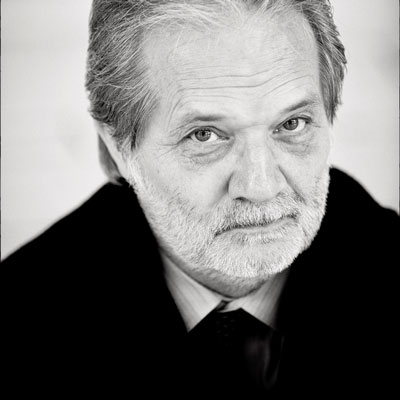
PETER EÖTVÖS, Cyfansoddwr
Peter Eötvös yw un o’r cyfansoddwyr mwyaf cyffrous a theatrig sydd yn gweithio heddiw. Maewed ysgrifennu rhyw 10 opera gyda nifer ohonyt yn cael eu perfformio o amgylch y byd er taw dim ond tri sydd wedi cael eu gweld yn y DG. Fe fynychom berfformiad cyntaf y Golden Dragon yn 2014 ac fe gawsom wefr wrth weld bywiogrwydd a hyfedredd y sgôr a theatricalrwydd y darn. Ar gyfer ein cynhyrchiad newydd, mae Eötvös wedi creu fersiwn newydd yn Saesneg, gan gynnwys peth ailweithio cyffrous o’i sgôr wreiddiol.
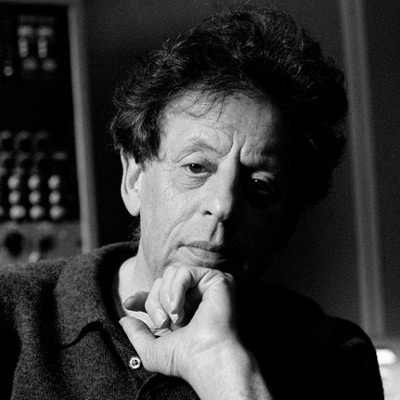
Philip Glass, Cyfansoddwr
Anaml iawn bydd y dywediadau ‘dilyniant cwlt’ a ‘cyfansoddwr clasurol cyfoes’ yn ymddangos yn yr un frawddeg, ond mae Philip Glass yn enghraifft o hyn. Yn un o gyfansoddwyr byw mwyaf poblogaidd y byd, ceir canmoliaeth mawr iddo am ei operau, simffoniau, cyfansoddiadau ar gyfer ffilmiau, ar gyfer ei ensemble ei hun, a’i weithiau ar y cyd gydag artistiaid sydd yn amrywio o Twyla Tharp i Allen Ginsberg, Woody Allen i David Bowie. Cafodd effaith rhyfeddol a digyffelyb ar fywyd cerddorol a deallusol ei gyfnod ac mae wedi casglu amrywiaeth o ddilynwyr niferus a theyrngar ar hyd y ffordd.
Ganed Philip Glass yn Baltimore yn 1937, ac fe ddarganfyddodd gerddoriaeth yn siop drwsio radio ei dad. Yn ogystal â chynnal a chadw radios, roedd gan Ben Glass nifer o recordiau a phan fyddai rhai yn gwerthu’n wael, byddai’n eu cymryd adref ac yn eu chwarae i’w dri o blant, gan geisio canfod pam nad oedden nhw’n apelio i’w gwsmeriaid. Digwyddai’r rhan fod yn recordiau o weithfeydd siambr mawreddog, ac o fewn dim amser, fe ddaeth yr egin gyfansoddwr yn gyfarwydd â phedwarawdau Beethoven, sonatas Schubert, simffoniau Shostakovich a cherddoriaeth arall a ystyriwyd bryd hynny yn "anarferol”. Roedd Glass yn ei arddegau hwyr cyn iddo ddechrau clywed y clasuron mwy "safonol".
Galwyd y ffurf gerddorol newydd roedd Glass yn ei esblygu yn “leiafsymiaeth” (minimalism). Term oedd hwn nad oedd Glass yn ei hoffi ac roedd yn well ganddo siarad am ei hun fel cyfansoddwr “cerddoriaeth gyda strwythurau ailadroddol”. Mae ei gerddoriaeth yn seiliedig ar ailadrodd darnau byr, cain, melodaidd sydd yn plethu mewn ac allan fel rhyw frodwaith i’r glust. Yn ei gerddoriaeth, caiff y gwrandawr ei “ymdrochi mewn math o dywydd sonig sydd yn troellu, troi a datblygu”.
Fodd bynnag, does dim byd “lleiafsymiol” ynglŷn â’i gynnyrch. Yn ystod y 25 mlynedd diwethaf yn unig, cyfansoddodd dros 20 opera, wyth simffoni, chwe concerto, cerddoriaeth i bedwarawdau llinynol, ffilmiau, a chorff cynyddol o waith ar gyfer piano ac organ unigol.
Ymhlith ei weithiau mwyaf adnabyddus mae operau fel Einstein on the Beach, The Voyage a Satyagraha (gwerthwyd pob tocyn ar gyfer cynhyrchiad canmoladwy’r ENO) a’r gerddoriaeth i’r ffilmiau Koyaanisqati, The Thin Blue Line, Notes on a Scandal, The Hours (enillydd BAFTA) a The Truman Show a enillodd wobr Golden Globe.
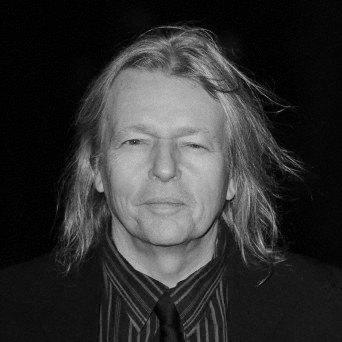
Christopher Hampton, Libretto
Awdur a sgriptiwr Prydeinig, sydd hefyd yn gynhyrchydd a chyfarwyddwr ffilm yw Christopher Hampton.
Caiff ei adnabod orau am ei ddrama seiliedig ar y nofel Les Liaisons Dangereuses a’r fersiwn ffilm ohono, Dangerous Liaisons (1988) ac yn fwy diweddar, y sgript ar gyfer yr addasiad ffilm a wnaed o Atonement gan Ian Mcewan. Yn ogystal â hyn, mae wedi creu catalog rhyfeddol o addasiadau, libretti, cyfieithiadau, sgriptiau teledu a ffilm, cynhyrchiadau ffillm a dramau gwreiddiol.
Dechreuodd ddiddordeb Christopher mewn theatr tra ei fod yn astudio Ffrangeg ac Almaeneg ym Mhrifysgol Rhydychen, ac fe ysgrifennodd ddrama yn ei flwyddyn gyntaf. Roedd cynhyrchiad y Royal Court mor llwyddianus hyd nes iddo drosglwyddo i’r Comedy Theatre ac yntau’n dal i fod yn fyfyriwr a hefyd y person ieuengaf erioed i fod wedi cael ei ddrama wedi ei berfformio yn y West End – record sydd yn sefyll hyd heddiw. Dywedodd ar y pryd ei fod yn gobeithio taw fe fyddai’r person hynaf hefyd i gael drama wedi’i lwyfanu yn y West End, uchelgais y mae eto i’w gyflawnu.
Hyd yn hyn mae ei ddramau, sioeau cerdd a chyfieithiadau wedi ennill pedair gwobr Tony, tair Gwobr Olivier, pedair gwobr Evening Standard a Gwobr Cylch Beirniaid Theatr Efrog Newydd; gwobrau am ei waith fffilm a theledu gan gynnwys Oscar, dau BAFTA, Gwobr Urdd Awduron America Award, y Prix Italia, Gwobr Arbennig y Rheithgor yng Ngŵyl Ffilm Cannes, Sgriptiwr ffilmiau y flwyddyn yn Hollywood, a’r Wobr Collateral yng Ngŵyl Ffilm Fenis am yr Addasiad Llenyddol Gorau.
Mae Christopher Hampton a Philip Glass wedi gweithio gyda’i gilydd o’r blaen: Glass ysgrifenodd y gerddoriaeth ar gyfer addasiad ffilm 1996 o The Secret Agent gan Joseph Conrad , a ysgrifenwyd a chyfarwyddwyd gan Hampton, a Hampton ysgrifenodd y librettos ar gyfer opera Glass, Waiting for the Barbarians (2005), sydd yn seiliedig ar nofel J M Coetzee ac ar gyfer Appomattox, sydd wedi ei osod yn erbyn cefndir Rhyfel Cartef America (2007), ac fe ydd fersiwn diwygiedig o hwn yn cael ei gyflwyno gan yr Opera Genedlaethol yn Washington D.C. yn 2015.
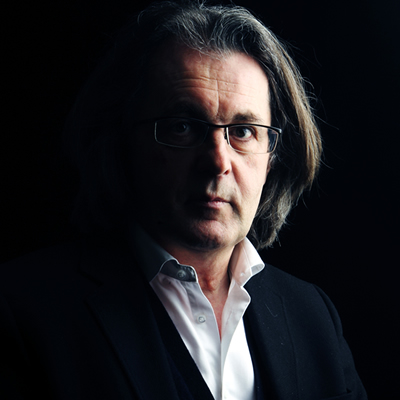
Pascal Dusapin, Cyfansoddwr
Cydnabyddir Pascal Dusapin fel cyfansoddwr cyfoes pwysicaf a mwyaf llwyddiannus Ffrainc, yn enwedig felly ym myd y theatr a’r tŷ opera. Passion fydd y cyntaf o weithiau llwyfan Dusapin i gael ei berfformio yn y Deyrnas Gyfunol. Pleser o’r mwyaf i ni yw cyflwyno gwaith cyfansoddwr mor bwysig sy’n uchel ei glod yn Ewrop, a hynny i gynulleidfaoedd yn y Deyrnas Gyfunol nad ydynt hyd yn hyn wedi cael cyfle i gael profiad o’r gwaith hwn yn eu gwlad eu hunain.
Gallwch ddysgu rhagor am waith Dusapin, a gwrando arno, yma

Amanda Holden, Cyfieithydd y Libreto
Cafodd Amanda Holden ei magu mewn teulu o feddygon lle roedd creu cerddoriaeth yn rhan o fywyd bob dydd. Ar ôl graddio mewn cerddoriaeth, enillodd ysgoloriaeth i’r Guildhall, Llundain, fel cyfeilydd. Bu hefyd yn astudio Therapi Cerdd, a hi oedd sefydlydd yr adran yn Ysbyty Charing Cross – sydd bellach wedi ei hadleoli i Ysbyty Chelsea a Westminster. Arhosodd yn y Guildhall, gan roi gwersi piano a gweithio fel cyfeilydd llawrydd hyd nes iddi, trwy hap a damwain, ei chael ei hun yn 1985 – gyda’i chyn-ŵr, Anthony – yn cyfieithu Don Giovanni ar gyfer Jonathan Miller yn yr English National Opera. Aeth ymlaen i ysgrifennu tua 60 o gyfieithiadau eraill a sawl libreto – yn cynnwys Bliss ar gyfer Brett Dean a The Silver Tassie ar gyfer Mark Anthony Turnage – ac am y gwaith hwnnw hi oedd yr awdur cyntaf i dderbyn Gwobr Olivier am Gyflawniad Rhagorol mewn Opera.
Caiff gwaith Amanda – a ystyrir fel “y fwyaf ffraeth a medrus o holl ymarferwyr cyfoes y grefft anodd hon” (The Daily Telegraph) – ei berfformio’n rheolaidd drwy’r byd Saesneg ei iaith. Mae ei chyfieithiadau diweddar ar gyfer yr ENO yn cynnwys Rodelinda (Handel) a Caligula (Glanert); derbyniodd ei Castor & Pollux (Rameau) enwebiad Olivier. Bydd cyfieithiadau Amanda o La Bohème a Lucia di Lammermoor (Donizetti) i’w clywed yn yr ENO yn nhymor 2018/19. Mae ei gwaith diweddar yn cynnwys fersiynau Saesneg o Orpheus gan Gluck (Opera Theatre of St Louis, Mehefin 2018) a The Snow Queen gan Hans Abrahamsen (a berfformir gyntaf yn 2019). Amanda hefyd yw sefydlydd-golygydd y Penguin Opera Guides; The Viking Opera Guide a The New Penguin Opera Guide sy’n cynnwys 850 o erthyglau ar gyfansoddwyr opera a’u gweithiau; mae argraffiad diweddaraf (y 5ed) o The Opera Guide, 100 Popular Composers, ar gael ar-lein: www.amandaholden.org.uk
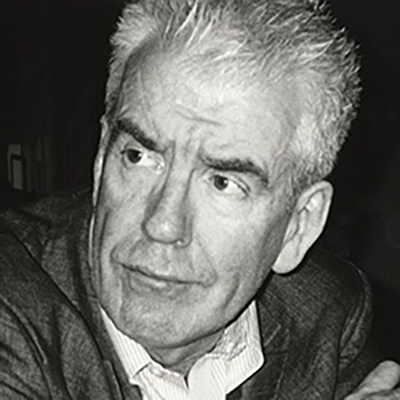
Gerald Barry, Composer
Ganed Gerald Barry yn Clare, Iwerddon, yn 1952 ac astudiodd yn Amsterdam a Cologne gyda Peter Schat, Karlheinz Stockhausen a Mauricio Kagel, ymhlith eraill. Daeth i enwogrwydd yn 1979 gyda gweithiau oedd yn cynnwys ‘________’ a Ø. Ers hynny mae wedi derbyn comisiynau gan y BBC Proms (Chevaux-de-frise), BBC Symphony Orchestra (The Conquest of Ireland, Day, Wiener Blut), Birmingham Contemporary Music Group (Dead March a Beethoven), London Sinfonietta (God Save the Queen a Feldman’s Sixpenny Editions), De Volharding Piano Quartet (Hard D), Ensemble 7Bridges (No People) a Bayerischer Rundfunk/Musica Viva a’r City of Birmingham Symphony Orchestra (ei Gonsierto i’r Piano, a gyfansoddwyd ar gyfer Nicolas Hodges), ymhlith eraill.
Comisiynwyd ei opera gyntaf, The Intelligence Park, gan yr ICA a pherfformiwyd hi am y tro cyntaf yn 1990 yn yr Aldeburgh Festival. Dilynwyd hi gan The Triumph of Beauty and Deceit (2002, Channel 4 Television a’r Aldeburgh Festival), The Bitter Tears of Petra von Kant (2005, English National Opera), La Plus Forte (2007, Radio France), The Importance of Being Earnest, enillydd Gwobr y Royal Philharmonic Society 2013 am Gyfansoddiad ar Raddfa Fawr, ac Alice’s Adventures Under Ground (2016, Los Angeles Philharmonic Association, Gustavo Dudamel, y Barbican Centre a’r Britten Sinfonia).
Recordiwyd cerddoriaeth Barry gan sawl ensemble, yn cynnwys yr RTÉ National Symphony Orchestra, y Nash Ensemble, BCMG, yr Almeida Ensemble, yr Irish Chamber Orchestra a’r Composers Ensemble, ar gyfer NMC, Black Box Music, Metronome Records a Discovery Recordings.
been recorded by ensembles including RTÉ National Symphony Orchestra, the Nash Ensemble, BCMG, the Almeida Ensemble, the Irish Chamber Orchestra and the Composers Ensemble, for NMC, Black Box Music, Metronome Records and Discovery Recordings.
Vincent Deane, Libretto
Mae Vincent Deane wedi ysgrifennu a darlledu ar Gerddoriaeth yr Ugeinfed Ganrif. Bu hefyd yn cyd-olygu cyfres o lyfrau o ddeunydd cyn-gyfansoddol James Joyce ar gyfer Finnegans Wake, a gyhoeddwyd fel The Finnegans Wake Notebooks at Buffalo.

Jessica Cottis, Arweinydd
Treuliodd Jessica Cottis ei chyfnod proffesiynol cynnar fel arweinydd cynorthwyol i Vladimir Ashkenazy gyda Cherddorfa Symffoni Sydney. Byth ers hynny mae ei pherfformiadau wedi ennill clod cyson yn y wasg, yn genedlaethol ac yn rhyngwladol.
A hithau wedi ei nodi’n ddiweddar fel “The ‘classical face’ to watch” (The Times), mae arddull ddeinamig Cottis o arwain, ei deallusrwydd cerddorol arbennig, a’i dull ysbrydoledig o roi arweiniad, wedi arwain at nifer o wahoddiadau i weithio fel arweinydd gwadd i gerddorfeydd megis y London Symphony Orchestra, Los Angeles Philharmonic Orchestra, Houston Symphony, London Philharmonic Orchestra, Royal Philharmonic Orchestra, BBC Symphony Orchestra, BBC Concert Orchestra, Cerddorfa Genedlaethol Gymreig y BBC, London Sinfonietta, Gävle Symphony Orchestra, Malmö Symphony Orchestra a’r Oulu Symphony Orchestra, yn ogystal â llu o wahoddiadau i ddychwelyd i’r BBC Proms.
Yn dilyn llwyddiant ei pherfformiad cyntaf yn y Royal Opera House yn 2017, yn arwain y premiere o Mamzer gan Na’ama Zisser, gwahoddwyd hi’n ôl ar unwaith i arwain y premier byd o The Monstrous Child gan Gavin Higgins; mewn adolygiad yn y Financial Times, dywedwyd “[it was] strikingly brought to life by the Aurora Orchestra conducted by Jessica Cottis”.
Bydd ei pherfformiadau y tymor hwn yn cynnwys dychwelyd at y Sydney Symphony Orchestra, a pherfformiadau cyntaf gyda’r Royal Liverpool Philharmonic, Singapore Symphony, a’r English Chamber Orchestra. Mae Jessica’n gweithio ar raddfa eang fel eiriolwr dros cerddoriaeth glasurol.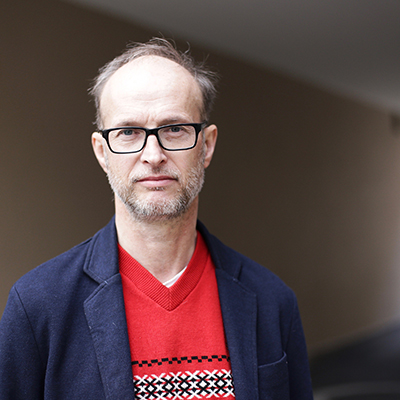
Nigel Lowery, Cyfarwyddwr a Dylunydd
Derbyniodd Nigel Lowery ei hyfforddiant yn Llundain, yn y Central St Martin’s School of Art and Design.
Ar ôl iddo raddio, roedd ei waith cynnar fel cynllunydd yn cynnwys Der Ring Des Nibelungen ar gyfer Covent Garden, Blond Ekbert (ENO), Inquest of Love (Brwsel) a Giulio Cesare yn Munich.
Bu’n cyfarwyddo am y tro cyntaf yng ngŵyl Batignano, a dilynwyd hynny’n fuan gan Il barbiere di Siviglia ar gyfer The Royal Opera a Hänsel und Gretel ar gyfer Theater Basel. Mae ei gynyrchiadau eraill yn cynnwys Rinaldo Tito L’italiana yn Algieri, Staatsoper yn Berlin, Figaro yn Stuttgart, a Candide ac Akhnaten yn Antwerp.
Mae e wedi gweithio’n agos ar nifer o operâu gyda’r coreograffydd Amir Hosseinpour – yn cynnwys Orphée et Eurydice yn Munich a Platée yn Amsterdam.
Gwelwyd ei gynyrchiadau mewn nifer o Wyliau Cerdd, yn cynnwys Aldeburgh, Barcelona, Berlin a Chaeredin.

Tim Anderson, Cyfarwyddwr Cerdd ar gyfer y DU
Mae Tim Anderson, sydd a’i deulu’n hanu o Brydain a’r Almaen, yn arweinydd sydd wedi ymgartrefu yn Llundain. Yn dilyn cyfnod yn astudio yn y New College, Rhydychen, gwahoddwyd Tim gan y diweddar Gerard Mortier i weithio yn y Teatro Real, Madrid yn 2013. Bellach, mae’n mwynhau gyrfa brysur yn gweithio gyda llawer o’r prif dai opera a’r prif gerddorfeydd yn Ewrop. Yn 2019, roedd Tim yn Arweinydd Cynorthwyol ar gyfer cyd-gynhyrchiad Music Theatre Wales a’r Royal Opera o The Intelligence Park gan Gerald Barry.
Tra oedd Tim yn gweithio ym Madrid, bu’n arwain perfformiadau ar gyfer yr adran addysg, a chynorthwyo i baratoi nifer fawr o gynyrchiadau ar gyfer y prif lwyfan. Ar ôl gadael Madrid bu’n répétiteur dan hyfforddiant gyda’r English National Opera, ac ers hynny mae wedi gweithio’n gyson yn Glyndebourne, gyda’r Northern Ireland Opera, y Nevill Holt Opera (lle mae ar hyn o bryd yn Arweinydd Cyswllt), yn ogystal ag yn Oper Stuttgart, Garsington Opera, a chyda Vladimir Jurowski a’r LPO.
Mae gan Tim brofiad eang ym maes opera gyfoes, yn cynnwys ei waith yn ddiweddar yn arwain y cynhyrchiad o Greek gan Mark-Anthony Turnage i ddathlu 30 mlynedd ers ei chyfansoddi yn yr Arcola Theatre, Llundain, mewn cynhyrchiad gan Jonathan Moore, y cyd-libretydd a’r cyfarwyddwr gwreiddiol. Yn ddiweddar, ymddangosodd Tim am y tro cyntaf gyda’r Birmingham Contemporary Music Group ac yn Snape Maltings.
Mae ei lwyddiannau pellach ym maes opera gyfoes yn cynnwys paratoadau cerddorol ar gyfer The Monstrous Child gan Gavin Higgins yn y Royal Opera House gyda Jessica Cottis; cynorthwyo Nicholas Kok ar y perfformiad cyntaf yn y DU o Silent Night yn Opera North; paratoadau cerddorol ar gyfer y premiere byd o Hamlet gan Brett Dean yn y Glyndebourne Festival gyda Vladimir Jurowski yn 2017, a chynorthwyo Nicholas Carter ar yr adfywiad yn yr Adelaide Festival 2018 gyda’r Adelaide Symphony Orchestra; paratoadau cerddorol ar gyfer The Gospel According to the Other Mary gan John Adams gyda’r English National Opera; Powder Her Face gan Thomas Adès gyda’r Northern Ireland Opera a’r Nevill Holt Opera; a To the Lighthouse gan Zesses Seglias yn y Bregenzer Festspiele.

Ksenia Ravvina, Cyd-grëwr a Dramatwrg
Cyfarwyddwr theatr, dramatwrg ac awdur cysyniadol a chanddi ddull amlddisgyblaethol o weithio sy'n cynnwys y celfyddydau gweledol, cerddorol a pherfformio.
Derbyniodd Ksenia Ravvina (Saint Petersburg, Rwsia) ei diploma fel hanesydd ym Mhrifysgol y Wladwriaeth yn Saint Petersburg. Bu'n astudio cyfarwyddo ar gyfer y theatr yn yr Academi Gerdd a'r Celfyddydau Perfformio yn Frankfurt. Yn 2010 enillodd y wobr am y Cyfarwyddwr Gorau am y ddrama White Nights yn yr International Dostoyevsky Chamber Festival, Staraya Russa, Rwsia. Yn nhymor y gaeaf 2014/2015 dechreuodd astudio am radd Meistr mewn Astudiaethau Theatr Cymhwysol ym Mhrifysgol Justus Liebig, Gießen, lle bu'n gweithio ar brosiectau golygfaol gyda Heiner Goebbels, Walid Raad, a Bojana Kunst ymysg eraill. Bu Ksenia Ravvina yn creu perfformiadau ar lwyfannau yn yr Almaen a Rwsia, yn cynnwys prosiectau ar gyfer y Staatstheater Wiesbaden, y Theater und Orchester Heidelberg, Staatstheater Darmstadt, a gweithiau amrywiol mewn cydweithrediad â'r Künstlerhaus Mousonturm Frankfurt, y Frankfurt LAB a'r Schwankhalle yn Bremen. Cydweithiodd gydag artistiaid amrywiol megis Artyom Ignatiev, Anastasia Kadruleva (Theater Ballet Moscow), Katja Cheraneva, Alexandar Hadjiev, Theodore Huffman, Kristina Veit, Philip Venables, The MichaelDouglas Kollektiv ac eraill.
Dewiswyd ei gwaith Adolescence ar gyfer rhaglen breswyl "Campustriennale Materclass" y RUHRTRIENNALE 2016. Yn 2017, cyfarwyddodd Ksenia Ravvina y KulturTagJahr 2016/17 - Altana Cultural Foundation yn Ysgol Charles Hallgarten, Frankfurt. Enillodd ysgoloriaeth ar y cwrs hyfforddi preswyl rhyngwladol, "next generation workspace", Theatr ar Gyfer Cynulleidfaoedd Ifanc yn Frankfurt 2017/2018. Gyda'i gwaith diweddaraf, Makulatur, treuliodd gyfnod preswyl aml-ddinas yn fframiau'r Tanzplattform Rhein-Main 2017/2018. Yng ngwanwyn 2018 gweithiodd fel dramatwrg ac ymgynghorydd artistig mewn perfformiadau ar gyfer Dirty Deal Theatre Riga a ZUKT_#TANZ Mousonturm Frankfurt.

Philip Venables, Cyfansoddwr
Yn aml, mae cerddoriaeth Philip Venables yn ymwneud â thrais, gwleidyddiaeth a llefaru o fewn cerddoriaeth gyngerdd ac opera. Caiff ei ddisgrifio fel "one of the finest composers around" (The Guardian) a'i waith fel "brutally effective" (The Times), "original and intelligent in both form and content…reminiscent of Matthew Barney's Cremaster Cycle" (Exeunt Magazine) a "brilliant, extreme work that grips like a vice and won't let go" (The Guardian).
Mae e'n cydweithio'n eang mewn gwaith traws-gyfryngol, yn cynnwys gyda'r artist Douglas Gordon ar Bound to Hurt (HAU Theater Berlin, Kampnagel Hamburg, Theater Basel), gyda'r artist drag/perfformiwr David Hoyle ar Illusions (London Sinfonietta, UK New Music Biennial), The Gender Agenda (London Sinfonietta) a'r gosodiad sain Canal Street (Manchester International Festival/Manchester Camerata) a gyda'r fiolinydd violinist Pekka Kuusisto ar Venables plays Bartók (BBC Proms/ BBC Symphony Orchestra). Cyhoeddwyd ei albwm gyntaf Below the Belt ar NMC yn 2018: "unmissable...music of forensic clarity and visceral force - but also great tenderness and generosity" (BBC Music Magazine); "if you only buy one classical disc advocating LSD and sodomy, make it this one" (Gramophone Magazine).
Ymddangosodd Philip gyda'r Royal Opera am y tro cyntaf yn 2016 gyda 4.48 Psychosis, wedi'i seilio ar y testun gan Sarah Kane, sef yr addasiad cyntaf erioed o'i gwaith hi i gael ei gymeradwyo. Cafodd yr opera (a gyfarwyddwyd gan Ted Huffman) ei chanmol gan yr adolygwyr pan berfformiwyd hi am y tro cyntaf, ac eto yn 2018 pan adnewyddwyd hi: "extraordinarily accomplished and imaginative writing" (The Stage); "a score ranging guilelessly from motoric arrhythmia to wispy renaissance" (The Independent); "A new brand of opera" (The Times); "4.48 Psychosis opera is rawly powerful and laceratingly honest" (The Telegraph); "he ambushes and refreshes an old art form" (The Observer); "Experimentation in the service of absolute emotional precision: Venables's economical work is one of the most exhilarating operas in years, even while it gives voice to some of the darkest thoughts imaginable." (The Spectator). Enillodd yr opera y 2016 UK Theatre Award for Opera, y 2017 Royal Philharmonic Society Award for Large-scale Composition, a'r 2017 British Composer Award for Stage Work, ac enwebwyd hi ar gyfer Gwobr Olivier a Sky Arts South Bank Award.
Ganed Philip yn ninas Caer yn 1979 ac mae'n byw rhwng Llundain a Berlin. Roedd yn Gymrawd MacDowell gyda'r cyfarwyddwr Ted Huffman yn 2017, yn Gyfansoddwr Doethuriaethol Preswyl gyda'r Royal Opera House a'r Guildhall School of Music and Drama yn 2013-16, ac yn breswylydd Soundhub yn LSO St Luke's yn 2013. Astudiodd ym Mhrifysgol Caergrawnt ac yna gyda Philip Cashian a David Sawer yn yr Academi Gerdd Frenhinol, lle cafodd ei ethol yn Aelod Cyswllt (ARAM) yn 2016 am ei gyfraniad sylweddol i faes cyfansoddi. Dyfarnwyd i Philip grant AHRC am ymchwil Doethuriaeth i lefaru, trais a cherddoriaeth yn yr Academi Gerdd Frenhinol 2012-13, a chwblhaodd ei ddoethuriaeth yn y Guildhall School of Music and Drama gyda Julian Philips a James Weeks. Mae'n un o gyfarwyddwyr yr asiantaeth Bright Ivy Ltd.
Yn 2019 cynhelir premiere 4.48 Psychosis yn yr Unol Daleithiau (Prototype Festival, Dinas Efrog Newydd), Ffrainc (Musica Festival/OpОra National du Rhin), a'r premiere byd o'r fersiwn Almaenig (Semperoper, Dresden), cyfnod preswyl yn y Watermill Centre (Efrog Newydd, UDA), a datblygiad a pherfformiad cyntaf opera siambr newydd, Denis & Katya gydag Opera Philadelphia a Music Theatre Wales.

Ted Huffman, Awdur a Chyfarwyddwr
Mae Ted Huffman, sydd wedi'i leoli yn Llundain, yn awdur a chyfarwyddwr sy'n fwyaf adnabyddus am ei waith ym maes opera gyfoes.
Enillodd Denis & Katya - ei opera ddiweddaraf gyda'r cyfansoddwr Philip Venables a gomisiynwyd gan Opera Philadelphia - Wobr Fedora Generali 2019. Mae'r adolygwyr wedi cyfeirio at y gwaith fel "an intimate, haunting triumph" (New York Times), "a monumental, dramatically shattering event" (Parterre Box), a "the most brilliantly original operatic work I've seen in a decade . . . a sensitive, subtle and deeply questioning meditation on youth, voyeurism, and the age of social media" (Musical America).
Ar y cyd â Venables, mae e hefyd wedi ysgrifennu Alice ar gyfer llais tenor a phiano, yn seiliedig ar atgofion y tenor Daniel Shelvey o'i fam-gu, a The Big History of Little England, opera i blant sy'n adrodd stori Lloegr o'r 'Big Bang' hyd at Brexit mewn deuddeg munud. Ar hyn o bryd, maen nhw'n gweithio ar gomisiwn llawn arall.
Yn ystod tymor 2019/20, bydd Ted yn gwneud ei ymddangosiadau cyntaf fel cyfarwyddwr yn y Deutsche Oper Berlin, Palau de les Arts Reina Sofia, Opéra national du Rhin ac Opera Philadelphia, yn ogystal â dychwelyd i Opernhaus Zürich, Festival d'Aix-en-Provence, ac Opéra national de Montpellier ar gyfer cynyrchiadau newydd.
Enillodd ei gynhyrchiad o 4.48 Psychosis (Venables/Kane) ar gyfer y Royal Opera House Wobr yr UK Theatre am y Cynhyrchiad Opera Gorau, yn ogystal ag enwebiadau am y cynhyrchiad gorau ar gyfer Gwobr Oliver, Gwobr RPS, a Gwobr South Bank Sky Arts. Teithiodd y cynhyrchiad hwn i'r Prototype Festival (NYC) ac i'r Opéra national du Rhin. Derbyniodd ei gynhyrchiad o Il trionfo del tempo e del disinganno ar gyfer y Royal Theater Copenhagen a Malmö Opera enwebiad Gwobr Reumert ac enwebiad Gwobr Copenhagen Culture am yr Opera Orau, a chaiff ei pherfformio y flwyddyn nesaf yn yr Opéra national de Montpellier. Mae ei wobrau eraill yn cynnwys Gwobr WhatsOnStage, enwebiad Gwobr RPS am The Lighthouse (Maxwell-Davies) yn y Linbury Theatre ac enwebiad fel Cyfarwyddwr Gorau yn yr Opernwelt Jahrbuch ar gyfer El Cimarrón (Henze).
Mae gwaith Ted yn y gorffennol yn cynnwys Madama Butterfly (Opernhaus Zürich), Rinaldo (Oper Frankfurt), Salome (Oper Köln), Le premier meurtre gan Arthur Lavandier (Opéra de Lille), A Midsummer Night's Dream (Opéra national de Montpellier), Macbeth gan Luke Styles (Glyndebourne), Svádba gan Ana Sokolovic (Festival Aix-en-Provence, Opéra Angers-Nantes, Les Théâtres de la ville de Luxembourg, Festival Ljubljana), Les mamelles de Tirésias gan Poulenc (La Monnaie, Festival d'Aix-en-Provence, Dutch National Opera, Juilliard Opera, Aldeburgh Festival), a Der Kaiser von Atlantis gan Ullmann (Central City Opera, Juilliard Opera, Greenwich Music Festival).
Ac yntau'n dod yn wreiddiol o Efrog Newydd, astudiodd Ted y Dyniaethau ym Mhrifysgol Yale cyn mynd yn brentis gyda'r Merola Opera Program, San Francisco. Roedd e'n Gymrawd MacDowell yn 2017.
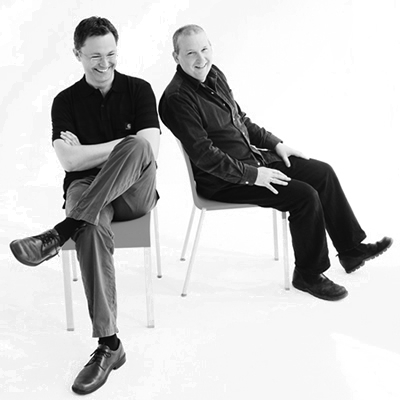
Cynllun sain a ddarparwyd ar gyfer y DU
Mae Sound Intermedia, a lansiwyd yn 1996 gan Ian Dearden a David Sheppard, yn ymhyfrydu yn yr her o ddod â gwaith newydd i’w cynulleidfa. A hwythau’n enwog am eu cynlluniau sain soffistigedig ar gyfer digwyddiadau byw, maent wedi gweithio mewn neuaddau cyngerdd a thai opera ledled y byd, gan gydweithio â llawer o’r bobl dalentog fu’n creu a pherfformio cerddoriaeth newydd dros y 70 mlynedd diwethaf.
Gofynnir am eu profiad pan fo digwyddiadau eithriadol yn mynd y tu hwnt i’r patrymau sefydledig. Maent wedi dyfeisio a churadu gosodiadau a pherfformiadau mewn amgueddfeydd, orielau celf, a llu o fannau anghyffredin ar draws y byd – o Draeth Venice, California i draeth Aldeburgh yn Suffolk; o dwneli trenau tanddaearol Llundain i hofrenyddion uwchben dinas Paris.
Eu nod yw cymell a dylanwadu ar gerddorion, technegwyr a chyfansoddwyr trwy berfformiad awdurdodol, a throsglwyddo eu dyfeisgarwch ymlaen i’r genhedlaeth nesaf er mwyn bod o gymorth i gerddoriaeth y dyfodol.
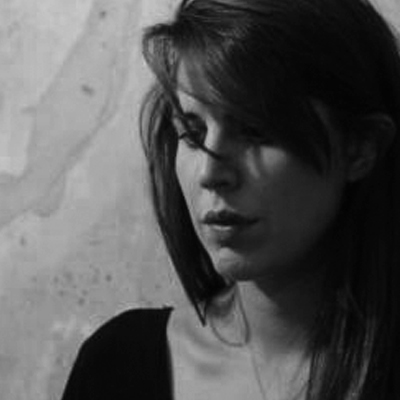
Alice Birch, Awdur
Alice Birch yw enillydd y Gwobr yr Arts Foundation am Ysgrifennu Drama 2014, a chyd-enillydd Gwobr George Devine am y Dramodydd Mwyaf Addawol 2014; enillodd hefyd Wobr Susan Smith Blackburn 2018 am ei drama ANATOMY OF A SUICIDE, a hithau wedi ei chynnwys ar restr fer y Wobr yn 2012 a 2015.
Mae ei gwaith ffilm yn cynnwys Lady Macbeth, a enillodd wobr BIFA am y Sgript Sgrin Gorau yn 2017 ac a enwebwyd ar gyfer yr Outstanding Debut & Best British Feature BAFTA 2018. Cafodd ei hail ffilm nodwedd, addasiad o nofel Graham Swift Mothering Sunday ar gyfer Number 9 Films a Film 4, ei rhyddhau yn 2021. Mae hi hefyd yn addasu’r nofel boblogaidd The Silent Patient ar gyfer Plan B.
Yn ogystal, mae Alice wedi ysgrifennu ar gyfer y teledu, gan weithio ar Normal People (BBC / Element Pictures) a addaswyd o’r nofel gan Sally Rooney. Gweithiodd Alice hefyd ar yr addasiad sydd ar y gweill o waith Sally Rooney, CONVERSATIONS WITH FRIENDS. Yn 2022 bydd ei chyfres deledu newydd, DEAD RINGERS, yn cael ei dangos am y tro cyntaf ar Amazon, gydag Alice yn Brif Awdur a Chynhyrchydd Gweithredol. Roedd hi hefyd yn ystafell yr awduron fel Golygydd Stori ar gyfer Tymor 2 o Succession (HBO).
Ar gyfer y theatr, mae Alice wedi ysgrifennu [BLANK] (Donmar Warehouse / Clean Break); Orlando (Schaubühne, Berlin); La Maladie de la Mort (Bouffes du Nord); Anatomy of a Suicide, Ophelia’s Zimmer, Revolt. She said. Revolt again (Royal Court Theatre); We Want You To Watch (National Theatre); The Lone Pine Club (Pentabus); Little Light (Orange Tree); Little on the inside (Almeida/Clean Break); Salt (Comedie de Valence); a Many Moons (Theatre503).
Yn 2016, dewiswyd Alice fel un o’r Creative England 50, sef rhestr fer o unigolion a chwmnïau a ddyfarnwyd fel y meddyliau mwyaf dyfeisgar, arloesol a chreadigol yn y wlad. Yn 2015, enwebwyd Alice ar gyfer Gwobr Friedrich Luft.
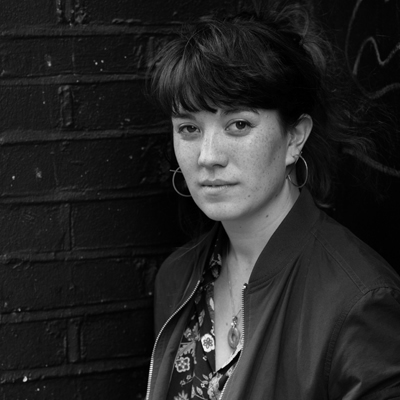
Jude Christian, Cyfarwyddwr
Mae gwaith blaenorol Jude Christian fel cyfarwyddwr yn cynnwys Dark Night of the Soul (Shakespeare’s Globe); My Mum’s a Twat, Bodies, Lela & Co. (Royal Court); othellomacbeth, Jack and the Beanstalk (Lyric Hammersmith); Trust; I'd rather Goya robbed me of my sleep than some other arsehole (Gate); Parliament Square (Bush; Royal Exchange); Split/Mixed (Soho) a Peter Pan (Brageteatret). Mae ei waith ysgrifenedig yn cynnwys Nanjing (Theatertreffen Stückemarkt), Kan Yama Kan (Anthology), Cinderella (Lyric Hammersmith) a Dick Whittington (National Theatre).
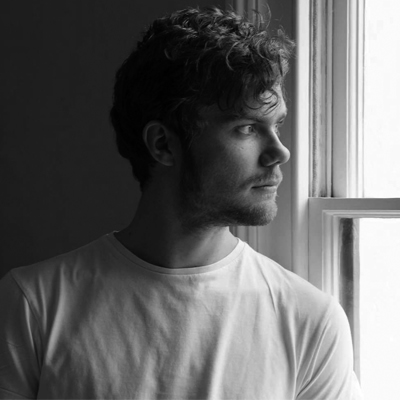
Tom Coult, Cyfansoddwr
Ganed y cyfansoddwr Tom Coult yn Llundain yn 1988. Mae ei gerddoriaeth chwareus a hudolus wedi cael ei hyrwyddo gan nifer o’r prif gerddorfeydd ac ensemblau yn y DU, gan arwain at gyfres o ddarnau ar raddfa fawr a dderbyniodd ganmoliaeth uchel, yn cynnwys Beautiful Caged Thing ar gyfer y soprano Claire Booth a’r Mahler Chamber Orchestra; Sonnet Machine ar gyfer Cerddorfa Philharmonic y BBC, a St John’s Dance (a berfformiwyd am y tro cyntaf gan Edward Gardner a Cherddorfa Symffoni’r BBC ar Noson Agoriadol y BBC Proms yn 2017).
Yn 2021 cafodd ei benodi’n Gyfansoddwr Cyswllt gyda Cherddorfa’r BBC Philharmonic, sydd wedi perfformio’i gerddoriaeth ar sawl achlysur; darn mawr cyntaf ei gyfnod preswyl oedd Pleasure Garden, concerto ar gyfer y fiolinydd Daniel Pioro, a ddarlledwyd hefyd ar BBC Radio 3. Mae Tom wedi mwynhau cysylltiadau eraill gydag ensemblau megis y Britten Sinfonia a’r London Sinfonietta (a gyflwynodd y perfformiad cyntaf o Spirit of the Staircase, a enwebwyd ar gyfer y South Bank Sky Arts Award), ac yn 2022 bydd yn Gyfansoddwr Preswyl yng Ngŵyl Musikdorf Ernen, y Swistir.
Disgrifiwyd ei gerddoriaeth fel
‘funny and surreal and delicately poetic, all at once’ (The Telegraph), a ‘full of bewitching sounds . . . fresh and precisely imagined’ (The Guardian) – ‘Coult is a composer who spins glittering, teasingly ambiguous patterns out of simple-seeming material . . . a very individual voice’(The Telegraph).
Cafwyd perfformiadau cerddorfaol eraill gan y Netherlands Radio Philharmonic, Cerddorfeydd y Royal Philharmonic a Cherddorfeydd y Swan, tra bod ei weithiau siambr wedi eu perfformio gan ensemblau yn cynnwys yr Arditti Quartet, Psappha, Quatuor Diotima, Fidelio Trio, Riot Ensemble ac unawdwyr o’r Philharmonia.
Astudiodd Tom ym Mhrifysgol Manceinion gyda Camden Reeves a Philip Grange, ac yn King’s College Llundain gyda George Benjamin. Rhwng 2017 a 2019 bu’n Gymrawd Cyffredin Gwadd yn y Celfyddydau Creadigol yng Ngholeg y Drindod Caergrawnt, ac yn addysgu ar gwrs cyfansoddi y Britten Sinfonia Academy a gyda Cherddorion Ifanc Aldeburgh. Mae’r gwobrau a enillwyd ganddo’n cynnwys Gwobr Paul Hamlyn i Artistiaid, Gwobr Goffa Lili Boulanger a Gwobr Cymdeithas y Royal Philharmonic am Gyfansoddi.
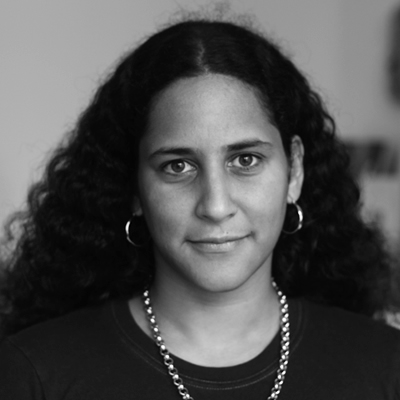
Rosie Elnile, Cynllunydd
Mae ei gwaith yn y theatr yn cynnwys: Run Sister Run; Sheffield Crucible, [Blank] Donmar Warehouse, Our Town (Theatr Awyr Agored Regent’s Park); The Ridiculous Darkness, Unknown Island, The Convert (Gate); The American Clock (Old Vic); The Wolves (Theatre Royal Stratford East); The Mysteries, Three Sisters (Royal Exchange, Manceinion); Abandon (Lyric Hammersmith); Returning to Haifa (Finborough Theatre); Goats (Royal Court); Prime Time (Royal Court Schools Tour); BIG GUNS (Yard).

Joshua Pharo, Cynllunydd Goleuo
Augmented (Told By An Idiot UK Tour); The Bee in Me (Unicorn); Cinderella (Lyric Hammersmith); Vassa (Almeida); The Color Purple (Leicester Curve a’r Birmingham Hippodrome); Noughts & Crosses (Taith y DU); Counting Sheep (Belarus Free Theatre); Going Through (Bush Theatre); othellomacbeth (Lyric Hammersmith/Home Manceinion); The Ridiculous Darkness, Trust, Medea, I’d Rather Goya Robbed Me of My Sleep, No Place Like Home (Gate Theatre); The Wolves (Stratford East); Future Bodies (Home Manceinion); 100: UnEarth (Wild Works); Nanjing (Sam Wanamaker Playhouse); Double Vision (Canolfan Mileniwm Cymru); random/generations (Chichester Festival Theatre); The Shape of Pain (China Plate, Fringe First Winner/Battersea Arts Centre); Hearty, Removal Men (Yard Theatre); The Claim (Taith y DU); La Tragédie De Carmen (Royal Opera House/Wilton’s Music Hall); Frau Welt (Hackney Showroom); Cosmic Scallies (Royal Exchange/Graeae); How I Hacked My Way Into Space (Unlimited Theatre/Taith); Bullish (Camden People’s Theatre); Burning Doors (Belarus Free Theatre); Bodies (Royal Court); Nest (Brighton/Take Off Festivals); How My Light Is Spent (Royal Exchange).
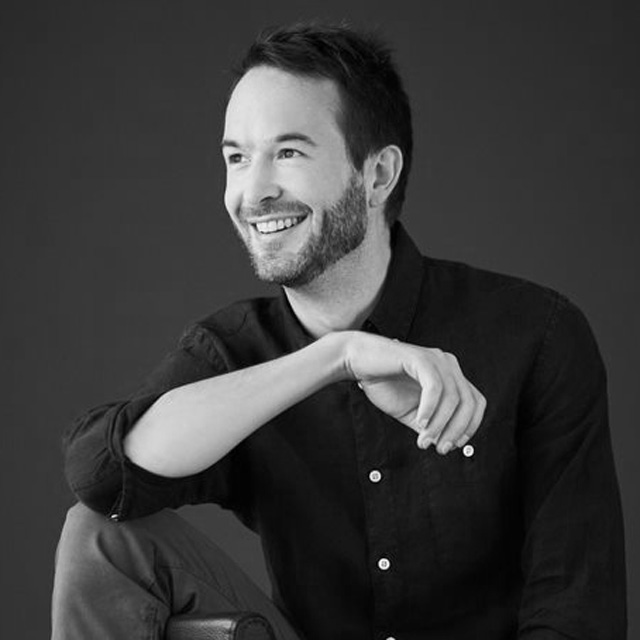
Andrew Gourlay, Arweinydd
Wedi ei eni yn Jamaica i deulu oedd yn hanu o Rwsia, treuliodd Andrew Gourlay ei ieuenctid yn y Bahamas, y Philippines, Japan a Lloegr. Ac yntau wedi ei hyfforddi fel trombonydd a phianydd, bu’n astudio crefft arweinydd yn y Coleg Cerdd Brenhinol lle bu’n paratoi symffonïau Bruckner ar gyfer Bernard Haitink, a symffonïau Mozart ar gyfer Syr Roger Norrington. Cafodd ei ddewis gan y cylchgrawn Gramophone fel ‘Yr Un i’w Wylio’, a chan Music Magazine y BBC fel eu ‘Seren y Dyfodol: artistiaid mawr yfory’.
Enillodd Andrew Gourlay y Wobr Gyntaf yng Nghystadleuaeth Ryngwladol Cadaques 2010 ar gyfer Arweinwyr, gan sicrhau cyngherddau gyda 29 o gerddorfeydd ledled y byd. Am y ddwy flynedd ddilynol roedd yn Arweinydd Cynorthwyol i Syr Mark Elder a Cherddorfa’r Hallé. Yn 2015 penodwyd Gourlay i swydd Cyfarwyddwr Cerdd yr Orquesta Sinfónica de Castilla y León (OSCYL), ar ôl treulio cyfnod fel eu Prif Arweinydd Gwadd ers y tymor 2014/15, a dathlodd ben blwydd y gerddorfa yn 25 oed yn 2016/17.

Alex Ho, Cyfansoddwr
Mae Alex Ho yn gyfansoddwr Prydeinig-Tsieinead sydd wedi ei leoli yn Llundain. Fel un o gyfansoddwyr ‘Soundhub’ Cerddorfa Symffoni Llundain, mae gweithiau Alex wedi cael eu perfformio/comisiynu gan yr LSO, Shanghai Philharmonic Orchestra, Royal Opera House, a’r National Opera Studio. Mae ei weithiau wedi bod yn rhan o Ŵyl SoundState (Canolfan y Southbank, Llundain), Sound Unbound (Canolfan y Barbican, Llundain), Chinese Arts Now (LSO St. Luke’s), a Late Junction y BBC. Roedd Alex yn gyd-enillydd Cystadleuaeth Philip Bates am Gyfansoddi yn 2016, yn un o ‘Leisiau Newydd 2018’ Sound and Music 2018, yn Artist yr Help Musicians UK Fusion Fund yn 2019, ac yn enillydd Gwobr George Butterworth 2020. Ymhlith ei brosiectau nesaf mae gwaith gyda’r Nevis Ensemble (comisiwn digidol, haf 2020) a’r Riot Ensemble (Gŵyl Crossroads, Salzburg, Tachwedd 2020). Graddiodd Alex gydag anrhydedd dosbarth cyntaf o Rydychen yn 2016 a chwblhau cwrs meistr yng Nghaergrawnt yn 2017, lle enillodd Wobr Arthur Bliss mewn Cyfansoddi. Ar hyn o bryd mae’n astudio am ddoethuriaeth yn y Coleg Cerdd Brenhinol (RCM) gydag ysgoloriaeth AHRC lawn (Efrydiaeth LAHP gyda chefnogaeth RCM).
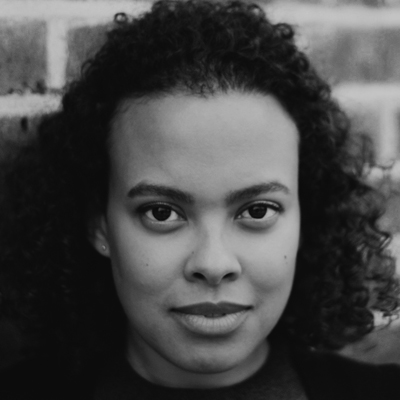
Elayce Ismail, Gwneuthurwr Theatr
Mae Elayce Ismail yn gweithio yn y DU ac yn rhyngwladol fel gwneuthurwr theatr, cyfarwyddwr opera a dramatwrg. Hi oedd Cyfarwyddwr Cyswllt RTYDS cyntaf y Northern Stage yn 2017/2018. Cyn hynny roedd hi’n Gyfarwyddwr Preswyl yn y National Theatre Studio fel enillydd Gwobr JP Morgan am Egin-gyfarwyddwyr, ac yn Gyfarwyddwr Cynorthwyol Jerwood yn y Young Vic. Mae ei gwaith cyfarwyddo’n cynnwys y canlynol: Omeros (Gate Theatre – addasiad/cyfarwyddyd); They Whisper Don’t Gaze at the Stars… (ENO), If Not Now, When? (NT); Nanjing (Royal Court/Shakespeare’s Globe); Under Milk Wood, The War of the Worlds (Northern Stage); Girls (HighTide Festival/Soho Theatre – dewiswyd ar gyfer Arddangosfa y Cyngor Prydeinig yng Nghaeredin); The Rise and Shine of Comrade Fiasco, Chorus, Spooky Action at a Distance (Gate Theatre); The Lost Ring (Deutsches Theater Berlin); Stay Another Song (Young Vic); When I Am Queen (Almeida). Mae ei gwaith mewn opera fel cyfarwyddwr adfywio/cyswllt yn cynnwys: 4:48 Psychosis (Opéra national du Rhin/Royal Opera House); A Midsummer Night’s Dream (Opéra Orchestre National Montpellier) a The Virtues of Things (Royal Opera House).

Cécile Trémolières, Dylunydd Gwisgoedd
Mae Cécile, a chanddi gefndir Ffrengig-Prydeinig, yn gynllunydd set a gwisgoedd hynod lwyddiannus. Hyfforddwyd hi yn y Wimbledon College of Arts, gan ennill gradd dosbarth cyntaf yn 2013.
Yn 2018 roedd hi, ynghyd â’r cyfarwyddwr Gerard Jones, yn enillydd 10fed Wobr yr European Opera am Gyfarwyddo. Roedd hi ymhlith y rhai a gyrhaeddodd rownd olaf Gwobr Linbury (2013) ac roedd yn Gynllunydd Ifanc Jerwood (2017).
Cyflwynwyd Bwrsari Jerwood Micro iddi yn 2017, Bwrsari The Royal Opera House Linbury yn 2015, a Gwobr yr Ideas Tap i Raddedigion yn 2014. Cafodd ei henwebu am y Cynllun Set Gorau yn y Gwobrau Theatr Off West End yn 2014.
Cafodd gwaith Cécile ei ddangos yn arddangosfa y World Stage Design 2017 yn ninas Taipei, yn y Prague Quadrennial 2015 fel rhan o Bafiliwn Prydain, ac yn arddangosfa y V&A, Make/Believe: UK Design for Performance, 2011–2015.
Mae ei chredydau’n cynnwys:
Am opera, Edmea (Gŵyl Wexford, Iwerddon), La Boheme (Theater Bielefeld), Manon (Mainz Staatstheater), Code Noir (Opera de Massy), La Tragédie de Carmen (Royal Opera House).
Am y theatr: Un qui veut Traverser (La Colline, Paris), Histoires de France (La Passerelle, Angoulême), Wuthering Heights (Royal Exchange, Manceinion), Midnight Movie, Hole (Royal Court, Llundain), Midsummer (Gŵyl Ryngwladol Caeredin), The Crucible, This Beautiful Future, The Mikvah Project (The Yard, Llundain), Suzy Stork (The Gate, Theatre National de Bretagne).

William Cole, Assistant Conductor and Répétiteur
Gyda repertoire sy’n ymestyn o faes opera cynnar hyd at gyfansoddiadau newydd, mae uchafbwyntiau diweddar William Cole yn cynnwys ei berfformiad cyngerdd cyntaf gyda’r Britten Sinfonia a’r Red Note Ensemble, Schnee gan Hans Abrahamsen gyda’r Royal Northern Sinfonia, a The Fairy Queen gan Purcell ar gyfer y Waterperry Opera Festival. Ac yntau’n weithgar yn y tŷ opera ac ar y llwyfan cyngerdd, mae ei ymddangosiadau diweddar a rhai sydd ar y gweill yn cynnwys prosiectau gyda’r Royal Opera Covent Garden, English National Opera, Opera North, Operá National du Rhin, Theater Aachen, Music Theatre Wales, Jerwood Opera Programme yn Snape Maltings, Nevill Holt Opera a’r Grange Festival. Mae’r digwyddiadau a ganslwyd yn sgil Covid-19 yn cynnwys tymor fel Pennaeth Cerddoriaeth ar gyfer yr English Touring Opera, a’i berfformiadau cyntaf gyda’r London Sinfonietta a’r Birmingham Contemporary Music Group.
Fel un sy’n angerddol dros hyrwyddo gwaith newydd ac arbrofol, mae’n Gyfarwyddwr Cerdd y Filthy Lucre, cydweithfa drochi aml-genre lle bu’n gweithio gydag artistiaid o faes dawns, cerflunio, a ffilm mewn cerddoriaeth o Xenakis i The Clash. Mae gweithiau eraill yn y maes hwn yn cynnwys darnau pwysig gan Ligeti, Boulez, Grisey, Vivier a Kurtág, yn ogystal â gweithiau newydd gan gyfansoddwyr yn cynnwys Patricia Alessandrini, Emily Howard, Shiori Usui a Laurence Osborn. Ar hyn o bryd mae’n aelod o raglen NEXT y Birmingham Contemporary Music Group. Mae ei ddosbarthiadau meistr a rhaglenni hyfforddi eraill yn cynnwys y rhaglen i arweinyddion yn Ysgol Haf Ryngwladol Dartington gyda Sian Edwards, Voix Nouvelles y Royaumont Abbey gyda’r Ensemble Linea a Péter Eötvös, a’r Seminar Arwain yng Nghanolfan Gerddoriaeth Tanglewood.
Astudiodd William yn yr Academi Gerdd Frenhinol, lle roedd yn Gymrawd Ailadroddydd, a bellach mae’n hyfforddwr gwadd yno.

Jackie Shemesh, Cynllunydd Goleuo
Mae ei waith theatr yn cynnwys: Death of England, Hansard, Death of England Delroy (National Theatre); Misty, The Beloved, Islands (Bush Theatre); What if Women Ruled the World, Ceremony (MIF); Vanya, Mary Stuart (Almeida); The Seagull (Jamie Lloyd Company); Changing Destiny, In the Penal Colony, Man, Oh my Sweet Land (Young Vic); The Return of Danton (Collective Ma’louba); White Noise (Bridge Theatre).
Mae ei waith dawns yn cynnwys: Heavy Handed we Crush the Moment (Barbican); Run Mary Run (Sadler’s Wells); Goat (Rambert); The Murmuring, Young Men (BalletBoyz); Beheld, Hot Mess, Let’s Talk About Dis (Candoco Dance); The Life and Times of Girl A (Scottish Dance Theatre); Lunatic (NDC Wells).
Mae ei gydweithrediadau eraill yn cynnwys Il ritorno d’Ulisse in patria (Grange Opera); Recital for Cathy, From Canyons to Stars (Hamburg Symphony Orchestra); TUTBU TV, JRMIP (Hebbel Berlin); Sante (LSO).

Adam Sinclair, Animeiddiad
Ers 2007, mae Adam Sinclair wedi arbenigo mewn modelu 3D ac animeiddio ar gyfer amgylcheddau amser real a gwaith fideo. Mae e wedi cydweithio’n agos gyda rhai o brif artistiaid y Deyrnas Unedig, yn cynnwys Ed Atkins, Helen Marten (enillydd Gwobr Turner 2016), Elizabeth Price (enillydd Gwobr Turner 2012) a Tai Shani (enillydd Gwobr Turner 2019). Mae gwaith cydweithredol Adam wedi cael ei arddangos mewn nifer o leoliadau ledled y byd, yn cynnwys yr amgueddfa celf fodern, Efrog Newydd, y Venice Biennale a’r Palais de Tokyo, Paris. Bu’n helpu artistiaid i ddefnyddio’r dechnoleg newydd i greu profiadau rhyngweithiol ac ymdrochol. Yn 2018 bu’n cydweithio gyda’r band ‘Ravioli Me Away’ i greu deunydd gweledol animeiddiedig 3D ar gyfer eu hopera ‘The View from Behind the Futuristic Rose Trellis’.
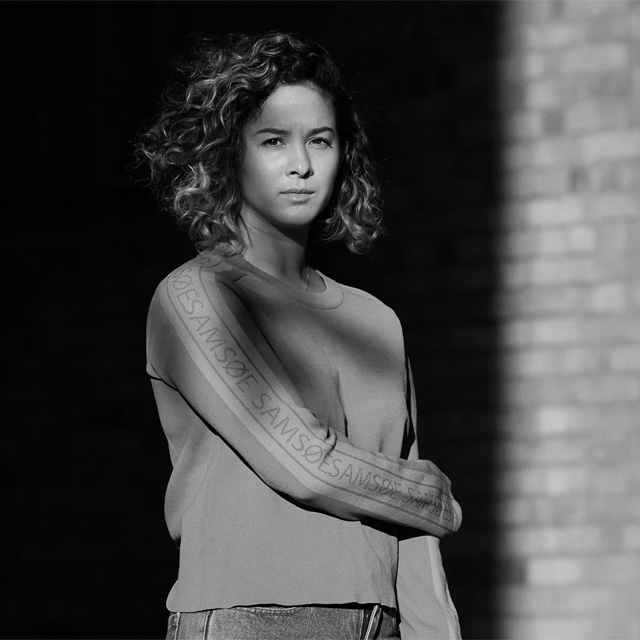
Jasmin Kent Rodgman, Cynllun Sain Cloch
Mae Jasmin Kent Rodgman – Artist, Cyfansoddwr a Chynhyrchydd sydd â’i gwreiddiau ym Mhrydain a Malaysia – yn tynnu at ei gilydd y meysydd clasurol cyfoes, electroneg a chelfyddyd sain i greu seinweddau neilltuol a hunaniaethau cerddorol. Mae hi’n cydweithio’n rheolaidd ar draws sawl ffurf o gelfyddyd yn cynnwys dawns, gair, ffilm a gwaith rhithiol.
Mae ei gwaith wedi cael ei berfformio ar draws y Deyrnas Gyfunol ac yn rhyngwladol gyda phartneriaid yn cynnwys yr LSO, London Sinfonietta, London Fashion Week, World Music Festival Shanghai, Edinburgh International Festival, Wilderness Festival, Bush Theatre a Roundhouse. Mae ei sgoriau ffilm wedi ymddangos yn fwyaf diweddar ar Lights Up (BBC Four), BBC Arts Culture in Quarantine, ac yng ngwyliau ffilm Sundance a SXSW.
Yn 2018/19 roedd hi’n Gerddor Preswyl y Cyngor Prydeinig ac Ymddiriedolaeth PRS: China, ac yn 2017/18 roedd yn Gyfansoddwr Jerwood gyda’r LSO. Yn 2020/21 cyflwnwyd iddi hefyd y PRS Foundation’s Women Make Music and Open Fund, Help Musicians Do It Differently, a a gwobrau Sound & Music a’r Bagri Foundation. Ewch i jkrodgman.com am ragor o wybodaeth

Maya Shimmin, Cyfarwyddwr Cynorthwyol
Mae Maya Shimmin yn wneuthurwr theatr, cyfarwyddwr a hwylusydd. Mae ei gwaith fel cyfarwyddwr yn cynnwys When Rachel Met Fiona (The Space), DOSAGE (Fable Workshop/ Theatre Deli/Camden People’s Theatre/The Yellow) ac Identities (The Pyramid, Warrington).
Derbyniodd Maya Breswyliad Clasurol Theatre Deli yn 2021, ac mae hi’n Gyfarwyddwr Cumbrian gyda’r RTYDS New Directions North mewn partneriaeth â’r Theatre by the Lake, Northern Stage, Leeds Playhouse a’r Royal Exchange Manceinion. Gosodwyd ei phrosiect cyfarwyddo yn ystod y cyfnod clo, sef Then and Now, ar restr fer y Ffilm Nodwedd Orau yng Ngŵyl Ffilmiau Ryngwladol Caerdydd 2021.
Mae Maya’n arbenigo mewn ymarfer cynhwysol ac yn gweithio’n rheolaidd gyda chwmnïau yn cynnwys yr Haringey Shed, Brent Youth Theatre a’r Blink Dance Theatre.
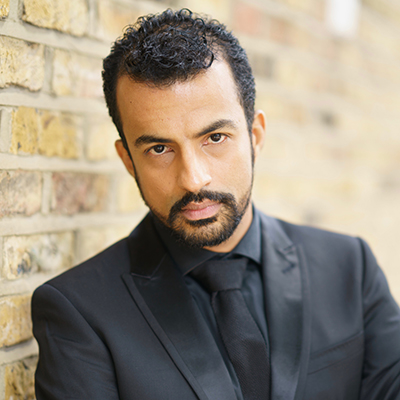
Michel de Souza - Bariton Robert Paradies
Ac yntau wedi ei eni yn Brasil, enillodd Michel de Souza y Maria Callas Vocal Competition yn São Paulo a’r Margaret Dick and Ye Cronies Competition yn y Conservatoire Brenhinol yn yr Alban.
Aeth yn ei flaen i ymuno gyda’r Jette Parker Young Artists Programme yn y Royal Opera Covent Garden. Mae e hefyd yn ymddangos yn rheolaidd mewn cyngherddau, yn cynnwys gyda’r BBC Scottish Symphony Orchestra yn y Proms, gyda’r L’Orchestre National de Lyon, yr Orchestra of Scottish Opera a’r Theatro Municipal yn São Paulo. Brasil.
Roedd yn Egin Artist yn Opera’r Alban, lle roedd ei rannau’n cynnwys Escamillo yn Carmen, Forester yn Cunning Little Vixen a Marullo yn Rigoletto. Yn y ROH Covent Garden ymddangosodd fel Schaunard yn La Boheme, Morales yn Carmen, Flemish Deputy yn Don Carlo, y Capten yn Eugene Onegin, Angelotti yn Tosca, a Mandarin a Ping yn Turandot.
Mae e wedi perfformio rhannau Schaunard yn La Boheme, Baron Grog yn La Grande Duchesse de Gerolstein, Leuthold yn Guillaume Tell a Starveling yn A Midsummer Nights Dream yn y Grand Théâtre de Genève, ac yn y Grange Park Opera canodd ran Sonora yn La Fanciulla del West a Grand Prêtre yn Samson et Dalila.
Yn Ne America mae e wedi perfformio rhannau Guglielmo yn Così fan Tutte yn y Teatro Argentino de la Plata, Belcore yn L’Elisir d’Amore a Conte Robinson yn Il Matrimonio Segreto yn y Theatro São Pedro, Papageno yn Die Zauberflöte yn y Theatro Municipal de São Paulo, a Crown yn Porgy and Bess yn y Grande Teatro do Palácio das Artes de Belo Horizonte.

Adrian Dwyer - Tenor D’Esperaudieu
Ganed Adrian Dwyer yn Melbourne, ac astudiodd yn y Guildhall School of Music and Drama a’r National Opera Studio. Gwnaeth ei ymddangosiad proffesiynol cyntaf fel Rodolfo yng nghynyrchiad Baz Lurhmann o La bohème yn Los Angeles, gan ennill Gwobr y LA Stage Alliance am Berfformiad Rhagorol. Ers hynny, mae e wedi perfformio’n fyd-eang mewn tai opera yn cynnwys Cape Town Opera, Opera de Toulon a’r State Opera of South Australia, Opera Comique Paris, ENO, Opera North, Scottish Opera, Opera Holland Park, Buxton Festival a NI Opera.
Ymhlith ei uchafbwyntiau y tymor hwn y mae ei ddychweliad i Opera Cenedlaethol Cymru fel Anatole yng nghynhyrchiad newydd David Pountney o War and Peace gan Prokofiev, yn dilyn yr hyn a alwyd gan yr adolygwyr fel ymddangosiad oedd yn “diffinio ei yrfa” gyda’r cwmni y tymor diwethaf, fel Andrei yn Khovanshchina gan Mussorgsky. Bydd hefyd yn rhoi perfformiadau cyntaf ar brif lwyfan Israeli Opera (Salome), Opera Zürich (Sweeney Todd) a’r Royal Opera House, Covent Garden, gan ddychwelyd i Opera Queensland fel Prince yn A Flowering Tree gan John Adams, ac i Longborough Festival Opera fel Mime yn y Ring Cycle – cynhyrchiad newydd y mae disgwyl mawr amdano.
Mae ei berfformiadau diweddar yn cynnwys ei berfformiad cyntaf yn y Teatro Real Madrid fel Sam Kaplan yn Street Scene, Electrician yn Powder Her Face gan Thomas Adès yng nghynhyrchiad agoriadol yr Irish National Opera (rhan roedd eisoes wedi ei chanu gyda Northern Ireland Opera ac a ailadroddodd yn ddiweddarach ar gyfer y Nevill Holt Festival) a Salome gydag Opera North.

Rhian Lois Jerusha Cramer
Mae Rhian Lois, y soprano o ganolbarth Cymru, wedi derbyn canmoliaeth uchel am ei pherfformiadau ar lwyfan yr English National Opera mewn rhannau megis Adele yn Die Fledermaus, Nerine yn Medea gan Charpentier, ac Atalanta Xerxes. Yn 2015 rhoddodd ei pherfformiad cyntaf yn y Royal Opera House, Covent Garden, fel Papagena, ac yn haf 2016 perfformiodd am y tro cyntaf yng Ngogledd America fel Zerlina yn Santa Fe.
Mae ei huchafbwyntiau diweddar yn cynnwys rhannau pwysig a pherfformiadau cyntaf: Nanetta yn Falstaff gan Verdi, gyda’r Grange Festival, a Valencienne yn The Merry Widow gan Lehar. Bydd hefyd yn perfformio mewn cyngerdd yn yr Enescu Festival. Yn y dyfodol mae hi’n edrych ymlaen at chwarae rhan fawr mewn gwaith gan Handel am y tro cyntaf gyda The English Concert, ac at ei pherfformiad cyntaf fel Despina yn Così fan tutte.
Roedd 2017/18 yn dymor o berfformiadau cyntaf pwysig i Rhian, yn cynnwys un yn y Grand Théâtre de Genève fel Angelika yn y premier Ewropeaidd o Figaro Gets a Divorce, a dwy ran newydd gyda’r English National Opera fel Susanna yn Le Nozze di Figaro a’r Governess yn The Turn of the Screw.
Mae’r uchafbwyntiau diweddar yn cynnwys dau berfformiad cyntaf mewn rhan gyda’r English National Opera fel Susanna yn Le Nozze di Figaro a’r Governess yn The Turn of the Screw; Susanna a Barbarina yn Le Nozze di Figaro, y premiere byd o Figaro gets a Divorce, ac Adele yn Die Fledermaus ar gyfer Opera Cenedlaethol Cymru. Ymhlith ei chyngherddau rhoddodd berfformiad ar gyfer yr International Opera Awards Foundation, yn ogystal â pherfformiad yn y Royal Albert Hall ynghyd â Chôr Kings College Caergrawnt fel rhan o’r Raymond Gubbay Christmas Festival.

Patrick Terry *Jette Parker Young Artist Serafino
Mae Patrick Terry yn aelod o’r Jette Parker Young Artists Programme yn y Royal Opera House, Covent Garden. Enillodd y Loveday Song Prize yng Ngwobrau Kathleen Ferrier 2017, yr Ail Wobr yn yr Handel Singing Competition 2019, ac mae’n un o Artistiaid y Samling Artist Programme. Cafodd Patrick Terry ei eni a’i fagu yn Janesville, Wisconsin.
Enillodd ei radd B. Mus. o Brifysgol Minnesota Twin Cities, lle bu’n astudio gydag Adriana Zabala, a graddiodd o’r Royal Academy of Music, Llundain – lle bu’n astudio gyda Caitlin Hulcup a Michael Chance ar y cwrs Opera, gyda chefnogaeth hael gan Ymddiriedolaeth Josephine Baker ac Ysgoloriaeth John J. Adams – yn haf 2018.
Ac yntau wedi ei ddewis ar gyfer y Leeds Lieder Young Artists Festival 2018, mae ei lwyddiannau pellach mewn cystadlaethau yn cynnwys ennill yr Ail Wobr yn y Joan Chissell Schumann Lieder Competition 2015, ennill y Maureen Lehane Vocal Award 2014, ac ennill y Richard Lewis/Jean Shanks Award 2017. Gyda’r Royal Academy Opera, canodd The Refugee yn Flight a Ruggiero yn Alcina.
Mae ei rannau operatig wedi cynnwys The Boy/Angel 1 yn Written on Skin gyda’r Melos Sinfonia, Oberon yn A Midsummer Night’s Dream ar gyfer y Chicago Summer Opera, Rosencrantz yn Hamlet gan Brett Dean ar gyfer Glyndebourne On Tour, a’r brif ran yn Teseo gyda La Nuova Musica yn y London Handel Festival 2018. Ymhlith yr uchafbwyntiau o ran cyngherddau y mae ei ymddangosiad yn y Wigmore Hall gydag Imogen Cooper.
Y tymor hwn, bydd yn teithio i Japan i ymddangos yn Le Promesse (Cyngerdd Gala gan yr Young Opera Singers Tomorrow of the World) yn y New National Theatre, Tokyo, ac yn canu rhan Arsace yn Berenice ac Artemis yn Phaedra gan Hans Werner Henze. Yn ystod 2018/2019, bydd hefyd yn dychwelyd i’r Wigmore Hall ar gyfer Heroes and Villains, yn ymddangos yn Beyond Jerusalem: The Life and Times of Sir Charles Hubert Parry yn y London Song Festival, ac yn canu Ruggiero yn Alcina gyda La Nuova Musica.
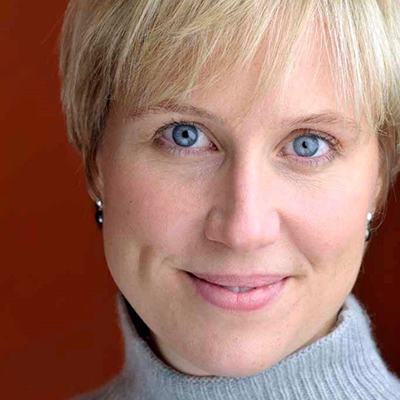
Stephanie Marshall Faranesi
Rhoddodd Stephanie Marshall, y mezzo-soprano o Ganada, ei pherfformiad cyntaf gyda’r Royal Opera yn 2013 fel Gwendolen Fairfax (The Importance of Being Earnest), rhan a ailadroddwyd ganddi yn 2016. Mae hi wedi dychwelyd i ganu Susannah (The Crackle) a Girl (Rise and Fall of the City of Mahagonny).
Astudiodd Marshall yn y Royal Academy of Music, ac roedd hi’n Artist Ifanc ac yn ddiweddarach yn Company Principal gyda’r English National Opera, lle roedd ei rhannau’n cynnwys Wellgunde (Der Ring des Nibelungen), Sonya (War and Peace), Mercédès (Carmen), Cherubino (The Marriage of Figaro), Annio (La clemenza di Tito), y brif ran yn The Handmaid’s Tale a Kasturbai (Satyagraha). Mae ei pherfformiadau operatig eraill yn cynnwys Arbate (Mitridate, re di Ponto) ar gyfer y Classical Opera Company, a Nancy (Albert Herring) ac Erika (Vanessa) ar gyfer Pacific Opera Victoria.
Mae Marshall wedi canu mewn cyngherddau gyda nifer o gerddorfeydd, yn cynnwys yr Hallé, English Chamber Orchestra, Britten Sinfonia a’r BBC Symphony Orchestra, ac wedi recordio gweithiau cyfoes gan gyfansoddwyr yn cynnwys Barry, Michel van der Aa a Ruders.
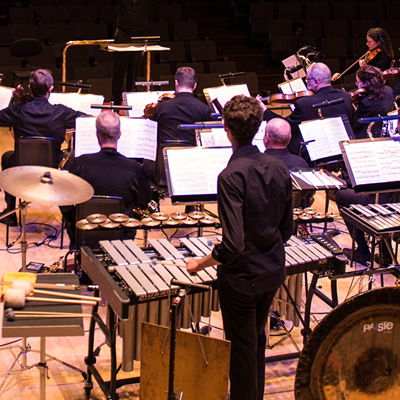
London Sinfonietta Ensemble
Mae’r London Sinfonietta yn un o’r prif ensemblau yn y byd ym maes cerddoriaeth gyfoes. Ar ôl ei sefydlu yn 1968, mae ymrwymiad y grŵp i greu cerddoriaeth newydd wedi arwain at gomisiynu 400 o weithiau a chyflwyno perfformiadau premiere cannoedd o rai eraill. Ei ethos heddiw yw i arbrofi’n gyson gyda chelfyddyd sy’n newid yn barhaus, gan dynnu at ei gilydd y goreuon o blith cerddorion, cyfansoddwyr ac artistiaid i greu gwaith sydd o’r radd flaenaf ac sydd hefyd yn cymryd risg. A hwythau â’u pencadlys yn Nghanolfan y Southbank ac yn Gysylltai Artistig yn Kings Place, gyda rhaglen brysur o deithiau ledled y Deyrnas Gyfunol a thramor, mae deunaw Prif Chwaraewr y London Sinfonietta ymhlith rhai o’r cerddorion gorau yn y byd.
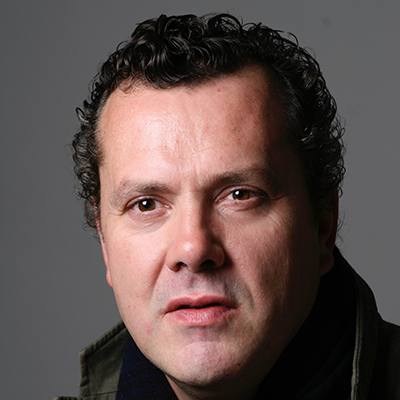
Stephen Richardson Sir Joshua Cramer
Astudiodd Stephen Richardson ym Mhrifysgol Manceinion a’r Royal Northern College of Music. Mae e wedi creu rhannau mewn nifer fawr o weithiau cyfoes pwysig, yn cynnwys The Tempest gan Thomas Adès (Royal Opera House); Orchestral Theatre II‚ Re‚ a Tea gan Tan Dun (Suntory Hall‚ Tokyo); The Triumph of Beauty and Deceit‚ The Importance of Being Earnest a The Intelligence Park gan Barry; Eis Thanaton‚ Resurrection‚ The Apocalypse a Fall and Resurrection gan Taverner (City of London Sinfonia‚ Eglwys Gadeiriol St Paul’s), a’r premier Prydeinig o The Handmaid’s Tale (ENO).
Mae ei rannau diweddaraf, a’r rhai sydd ar y gweill, yn cynnwys Hotel Manager a Duke yn Powder Her Face Irish National Opera‚ Powder Her Face (Nevill Holt Opera)‚ King of Hearts yn Alice in Wonderland gan Unsuk Chin (Los Angeles Philharmonic a’r Barbican)‚ Baron Ochs yn Der Rosankavalier (Bolshoi‚ Moscow ac Opera North)‚ Dansker yn Billy Budd (Rome Opera ac Opera North)‚ Geronte yn Manon Lescaut (Opera Holland Park)‚ Timur yn Turandot a Powder Her Face (Northern Ireland Opera)‚ Dikoy yn Katya Kabanova‚ Simone yn Gianni Schicchi a The General yn Silent Night (Opera North)‚ Bartolo a Rocco Fidelio (Garsington Opera)‚ Rocco (Bridgewater Hall gyda’r BBC Philharmonic Orchestra), a’r Messiah gyda’r Danish National Vocal Ensemble.
Mae ei berfformiadau diweddar yn cynnwys Hobson yn Peter Grimes (La Scala‚ ROH‚ Opera North a’r Aldeburgh Festival)‚ Geronte di Ravoir yn Manon Lescaut (Opera Cenedlaethol Cymru a’r Savonlinna Festival)‚ Sarastro yn The Magic Flute‚ Daland yn The Flying Dutchman a Lady Bracknell yn The Importance of Being Earnest (Northern Ireland Opera)‚ Rocco (Garsington a Winterthur Festival)‚ Frank yn Die Fledermaus (Korean National Opera)‚ Micha yn The Bartered Bride‚ Commandant yn From The House of The Dead a The Adventures of Pinocchio (Opera North)‚ Ferrando yn Il Trovatore (Den Jyske Opera).
Mae ei berfformiadau pellach yn cynnwys Falstaff a Sarastro (Opera Australia); Rocco‚ ll Giullare yn Francesco da Rimini a Stromminger yn La Wally (Opera Holland Park); Samuel yn Un ballo in maschera (Nationale Reisopera)‚ Kaspar yn Der Freischütz (Opéra de Rennes); Flint yn Billy Budd (Netherlands Opera)‚ Sir Joshua Cramer yn The Intelligence Park (Irish Museum of Modern Art‚ Dulyn)‚ Lady Bracknell (Los Angeles Philharmonic‚ Thomas Adès Festival)‚ Beethoven yn Schott and Sons gan Barry‚ Mainz (National Chamber Choir of Ireland‚ Dulyn)‚ Don Quichotte yn Le Chevalier Imaginaire gan Fénelon (Ensemble Intercontemporain)‚ ac X yn Powder her Face (London Symphony Orchestra).
Mae ei repertoire mewn cyngherddau’n cynnwys Anubis/Death of Kong yn The Second Mrs Kong gan Birtwhistle (Royal Festival Hall/Martyn Brabbins)‚ Hansel and Gretel (BBC Concert Orchestra)‚ Messiah (Carnegie Hall/Trevor Pinnock)‚ Oedipus Rex (BBC Stravinsky Festival/ Syr Andrew Davis)‚ Nixon in China (London Symphony Orchestra) a Where the Wild Things Are a Higglety Pigglety Pop! gan Knussen (Cleveland Orchestra a’r London Sinfonietta/ Knussen).
Mae ei recordiadau’n cynnwys Where the Wild Things Are‚ y brif ran yn Death of Moses gan Goehr (Unicorn Kanchana)‚ Ode for the Birthday of Queen Mary gan Purcell (DG Archiv)‚ The Flood gan Stravinsky ac A Midsummer Night’s Dream gan Britten (London Symphony Orchestra/Syr Colin Davis‚ Philips) ac Albert Herring (Chandos).


